#and i get it. it's hard to look at the world through someone else's lens
Text
Actually I've decided I'm sick of being cis people's only irl experience with genderqueer/nonbinary people
#stella speaks#personal#i swear the well-meaning ignorant stuff they say is almost more hurtful than actual malicious transphobia#i've accepted that there are people in my life i can never come out to#but my friends who love and support me and then say such casually transphobic stuff because they just don't know better?#that cuts deep#and i can't even be mad about it because i know they're not saying it from a place of malice#they never had to confront the gender binary until me and it's so so obvious with the stuff they say#they say they're with me 100% and then say the stupidest thing i've ever heard cause they're still using a binary mindset#and i get it. it's hard to look at the world through someone else's lens#and they don't have to think about any of it unless they're talking to me#but i'm tired of being the recipient of all their thoughtless comments#i just wish they could hear themselves sometimes#like. repeat that sentence to yourself. and then apply some critical thinking#where did that thought come from? who taught you that concept? can you think of any cases in which maybe that concept doesn't apply?#they're decent with binary trans peoplw (kind of)#i guess it's easier for them to wrap their heads around going fully from one to fully the other#but for people like me who exist somewhere outside that.... suddenly it's rocket science or something
5 notes
·
View notes
Note
HII I love your charts so much!
can i request bad men on how likely they are to cheat on their s/o?
this is looking through my american lens of cheating (going on a date, having sex, or long-term flirting with/basically dating someone who is not your partner)
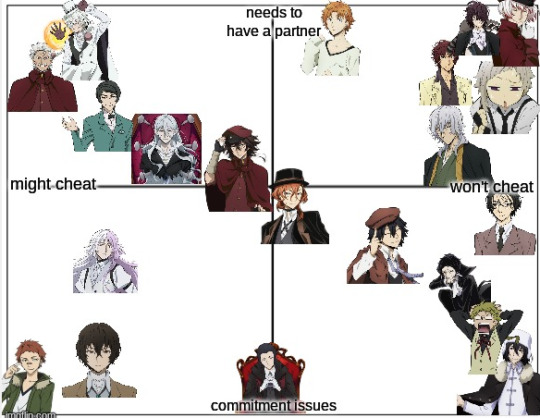
He needs the attention of a partner, but he still might cheat on you
Nikolai (is obsessed with you but is manipulative of your feelings; if you upset him, he might cheat on you to upset you back), Fukuchi (is so desperate for attention and praise that he'll seek it out from anyone even though he has you waiting for him at home, Mushitaro (needs the stability of having a partner but occasionally wonders if he's missing out on other romantic opportunities), Bram (feels it's his right as a person to have a partner but also to acknowledge when others are attractive...and sometimes get awfully close to them), and Tetcho (occasionally has moments of relationship panic which cause him to look for other people, but he always chickens out and comes back to you).
He would never cheat on you, and he lives for your attention.
Junichiro (needs someone to take control and lead him; would only stray if someone was coming onto him so strong that he felt like he couldn't get himself to say no), Oda (loves you and is devoted to you; despite his dangerous life, he will always be soft to you), Poe (is obsessed with you, adores you, and wants nothing more than you for the rest of his life), Jouno (realized that some things are worth protecting, you being one of them; he will fight for your honor and love until the end of time), Atsushi (needs your reassurance that he's worthy of love while he continues healing his life-long wounds; please be kind to him and he will always be kind in turn), and Fukuzawa (respects you even more than he loves you; what a despicable thing it would be to betray you by straying).
He has commitment issues which lead him to cheat on you.
Sigma (is so stressed out from work that he may occasionally take it out on a casino-goer who flirts heavily with him; why shouldn't he experience all that life has to offer?), Dazai (isn't sure how long he'll be here, so he can't fully shackle himself with a partner, regardless of how much love you give him), Tachihara (doesn't want to settle down because he's all over the world on missions; he'd rather be free as a bird, fucking whoever he wants whenever and wherever), and Mori (is so afraid to have a partner who could betray him or be taken from him that he uses his ability's manifestation, Elise, as a stand-in partner).
His commitment issues make him a flaky partner, but he'd never cheat on you.
Chuuya (occasionally feels suffocated, but reflects internally on his own issues and comes back to you and apologizes for being a shitty boyfriend), Ranpo (doesn't fully feel the need to have a romantic partner, but he likes you so much more than he's liked anyone else and you like him so he stays), Ango (is afraid to lose you which makes him wonder if he should leave first so that he doesn't have to deal with the heartache, but then he realizes how much it would hurt you and vows to stay and work extra hard to protect your relationship), Akutagawa (has rarely known tenderness, so you sometimes frighten him with the soft look in your eye when you kiss him; he feels like he's performing the role of boyfriend rather than being one, but he hopes he'll settle into it eventually), Kunikida (struggles to balance work with home which leads him to being bossy, but he also strives to be communicative so he's very receptive when you tell him he's being a shithead), Fyodor (takes a lot of convincing to settle into a relationship, but once he's there he only has eyes for you; he may occasionally leave you when he has to disappear on a mission, but he comes back with gifts and treasures and begs you to take him back, citing the unknown possibility of his death as the only reason he would have left you).
#ask answered#bsd x reader#bsd headcanons#ango x reader#ango headcanons#akutagawa x reader#akutagawa headcanons#atsushi x reader#atsushi headcanons#bram x reader#chuuya x reader#chuuya headcanons#dazai x reader#dazai headcanons#fukuzawa x reader#fukuzawa headcanons#fyodor x reader#fyodor headcanons#kunikida x reader#kunikida headcanons#junichiro x reader#mushitaro x reader#mushitaro headcanons#poe x reader#poe headcanons#ranpo x reader#ranpo headcanons#jouno x reader#tetcho x reader#fukuchi x reader
331 notes
·
View notes
Text
Critical Role's Previous Cameraman
I put up a post the other day about critical role's new animated introduction and I couldn't help but notice a sudden spike in the analytical stuff that I don't really understand. A more tech orientated friend of mine informed me that this was a good thing, actually. So, I thought I might capitalise on that and examine the previous campaign's opening sequence through the same lens and do some more analysis.
Let me explain.
SPOILERS AHEAD

One notable thing about this song is when it starts. Exactly eleven seconds in. That's eleven seconds of wait before the final payoff. You catch glimpses of what's happening above, but nothing else.
And that is a key theme of this campaign. The unseen. The Mighty Nein was a party characterised by trauma, and a lot of the time, you don't see that, you only see glimpses. A flash of a fight they told you about, and the sensation of drowning.
But then we meet Fjord.
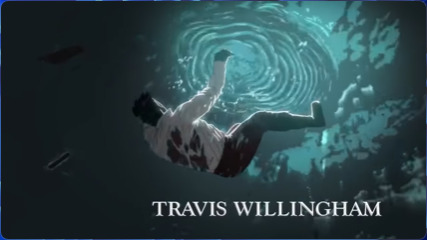
He's falling, and I'd like to point out the direction in which he is falling. You will notice the scars on his back, signifying he was probably in the process of running away, or was betrayed by someone, and he is falling towards those scars. Backwards. There is also a neat thing of falling away from the light, into the darkness, into the unknown. THis is someone out of control, leaning into the pain. And what is it that sees that?
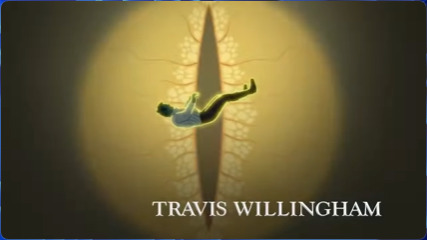
There is a reason Uk'otoa's design looks so much like a leach. The creature is a parasite, it doesn't find someone strong to break down, it found someone weak, and at its mercy, and brought him under its control. What this shot does is highlight that creature's opportunistic nature, but it also associates it very clearly with the visual of that eye.

And it's that eye that carries through. When Fjord washes up on the beach, when he is finally safe, he carries with him a little piece of Uk'otoa, a little piece of that trauma.
It's also notable of that it is an eye. It's obvious, but it colours his vision, and changes how he views the world. Its effects aren't physical, but mental.
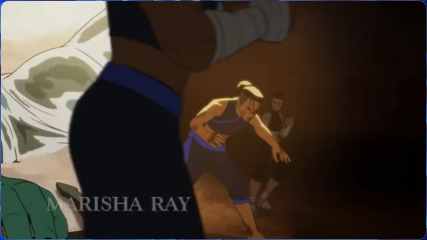
Beaureguard Lionet is a fighter. Not in the sense of class, because she isn't but in the sense of personality. Beau is a fighter in the sense that her first reaction to any problem is to punch it.
This transition is a wipe transition, but its important because of what it uses. It uses the opportunity to show off the uniforms of Beau's attackers, because otherwise the shadows of the rest of the shot make them hard to make out. These are wearing the same robes as her. Whoever they are, they are part of a team of some kind with her, they are people she should be able to trust, but look at how much damage they have done to her. Look at how heavily she is breathing. And look at what Beau does in response.

She fights back. This is how the animation gets across this character. She isn't complex, she doesn't need a great explanation, she doesn't have different sides to her, she just hits things until they stop being a problem.
I will also point out her eyes again. They are blue, not an unnatural eye colour, but they are the same blue as her robes, and the robes of those who are attacking her. Once again, the has warped the vision of its recipient, and in this case, it's creating a cycle of violence as all she knows how to do, is hit things.

We don't see Nott The Brave for a while in this animatic. We instead see, once again, the eyes. But I also want to point out that this was made before we knew about Veth. So we were just seeing the scared goblin.

This is as close as we get in this scene, and its Nott actively hiding from the light. The warmth scares her, and for good reason, its the same heat that we see emanating from her eyes. Once again, the trauma that has contaminated a character's vision is changing their reactions to the world.
And with that, I would like to talk about Jester, and I would like to do that in context.

The term "foil" in the context of a character was actually popularised by William Shakespear, who handily explained the metaphor for us.
"And like bright metal on a sullen ground,
My reformation, glitt'ring o'er my fault,
Shall show more goodly and attract more eyes
Than that which hath no foil to set it off."
Put in English, I shine brighter when you have something to compare me to. And this is what a foil character is, a character who brings about elements in other characters that can easily be missed, or who shows off by contrast their personalities.
Jester is one of the two characters in the Mighty Nein who is not a child of trauma, and her introduction shows that. She reacts to her life by laughing, and contrast that with everyone else. Fjord reaches for a sword, the item of his trauma; Beau tries to fight her trauma despite that approach clearly not working; and Nott hides from it, unable to reach out for help.
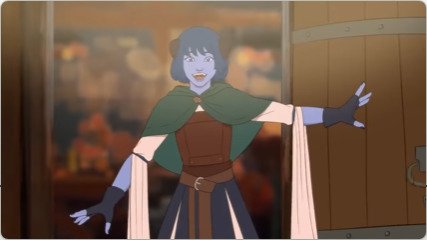
And it is notable that the first time we see an adult Jester, she looks normal (if a bit over cheerful), then is immediately contrasted with the rest of the Nein.
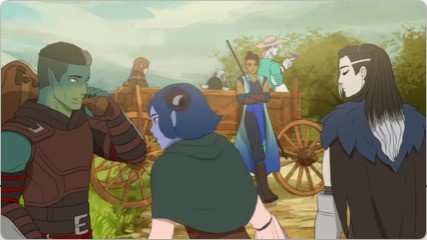
This not only shows just how different her demeanour is from the rest of the crew, but it shows her effect on them. She makes them all smile. Jester and Caduceus are very much support characters in the truest sense of the word. They support others. Jester shows genuine kindness towards everybody else, and it reflects onto them.

This shot is neat but not too special. Its a tracking shot on the hat of all things, because thats what important here, and it shows the traveling dynamic of the group. It's a tiny bit of tension in an otherwise calm scene, so the camera is steady, but speeds up slightly to match the movement of the object, then comes to a stop when it is caught. There is very little stress, but there is a sense of comradery.

Similarly, this shot establishes some stakes with a rising pan to show the scale of the threat and to show some more information, but it is hardly a monster, so the camera isn't really in a hurry.

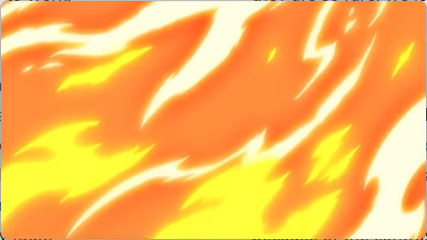
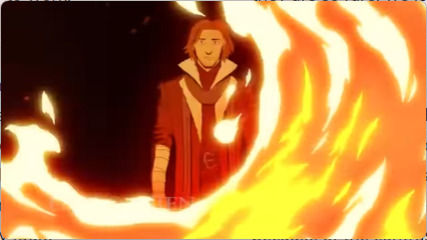
Enter Caleb Widogast, born in fire. I don't think they could write a more thematic entrance if they tried. An abrupt cut shows the night, then it is entirely consumed by fire, only to reveal Caleb.
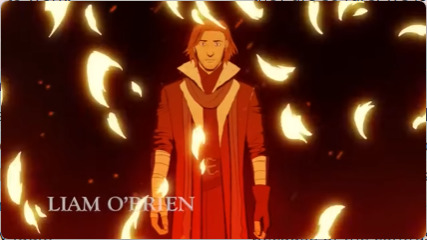
There is no motion here. The camera is stock still. This is the exact same thing with Ashton and FCG in the Bell's Hells. Caleb is disassociating from the heat in front of him, and there is a fascinating reason behind that. Caleb has two characters that need to be introduced to better understand him, the man, and Bren, the boy.
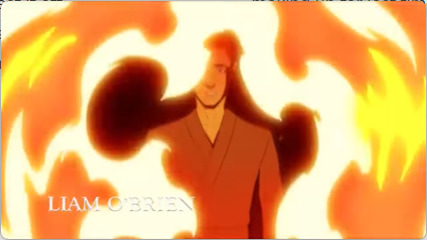
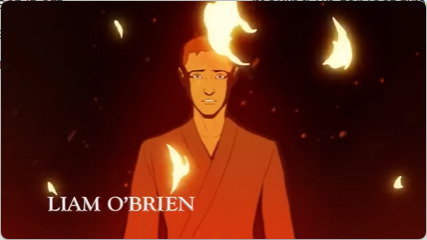
The flames consume the screen again, and then part to show a boy, staring at the screen, in horror. This is what you need to know about this character, this is a character forged in flames, born from the Ashes. Bren is dead, Caleb Widogast remains.

And this shot, with Caleb, Astrid and Eadwulf silhouetted against the fire, shows what kind of trauma we are talking about, and what effect it has. This is guilt, and in contrast with the rest of his party, this guilt is paralysing.
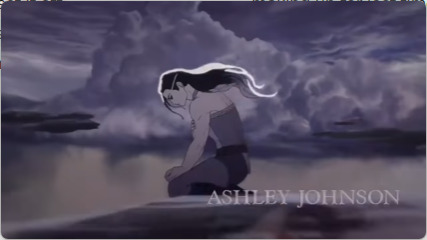
Yasha, however, is introduced in a calm way, in contrast to everything around her. The camera shows you a woman, meditating, and then pans backwards to reveal this:
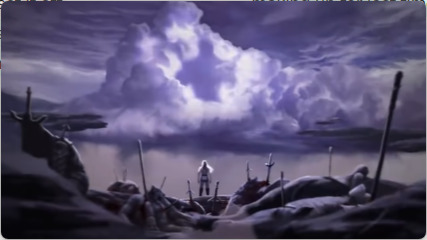
This is a woman surrounded by bloodshed, who has made a concerted effort to look away from it, and to look to the Storm Lord for guidance. This is a woman looking for healing, in comparison to everyone else, but that looking doesn't change the fact that that trauma is still there.
The next few scenes are cool, but don't really add anything to this analysis and I only have a few more images I can show here, so I'm going to skip to Taliesin's characters.
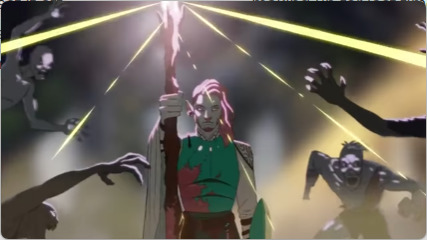
Caduceus has two introductions. One is this shot, which is a cool action shot of him casting an epic spell and vanquishing a crowd of enemies. But instead of the incredibly animated (in the sense of exaggerated poses) nature of his companions, Caduceus clay is calm and collected. He is unquestionably the anchor of the group, and where Jester contrasts them emotionally, Caduceus does so on a philosophical level. Caduceus is a gardener of fungus.

Mushrooms and other fungi are recyclers, they grow on dead trees and creatures and give a forest new life. They clear out the debris and make way for new things to take hold. That's what Caduceus does for the Nein, he helps them get through their trauma so that Jester can help them improve and become better.
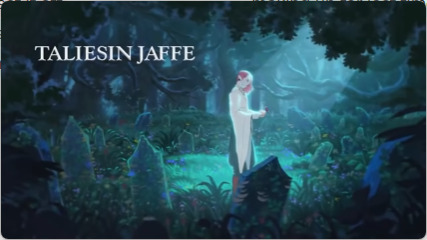
Caduceus's actual introduction is muted, and there's a point to that. He's not trying to be the main character, you don't need to understand his family life to understand him. You need to understand that can stand in a graveyard and see the light, that he is at peace with what has gone before him and helps people to get past it, and that his entire mission, to regrow the grove, isn't to bring back what is lost, but to help regrow something new in its place instead of the blight that lingers there.
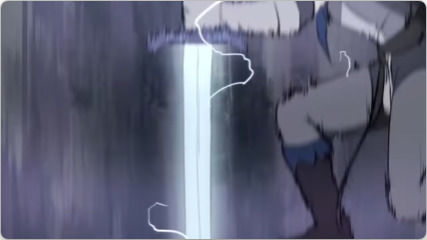
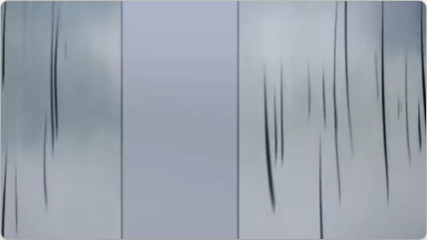
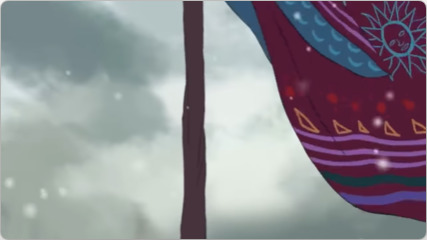
Mollymauk is introduced as a weapon transformed into a grave. That is what this transition is and I think that's really important. Mollymauk is, very clearly, a repurposed soul. He isn't the first person to inhabit that shell, and he isn't the last. I also want to point out how this character is represented here, not with a heroic memory, but with a quiet moment or remenicing on times gone by. He is a shadow that haunts the Nein.

This is by far the simplest shot in the entire video, and that's because it isn't telling you anything. You bring your own emotions to the table here, you bring the memories to the grave, that's how grieving works.
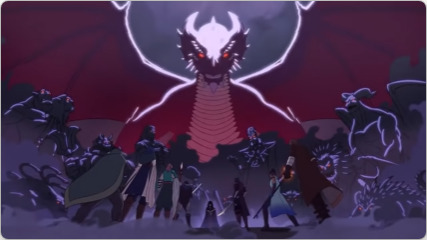
Once again, there is more to this video, but I'm only allowed to put 30 images in a single post. So I leave you with a quote from Niel Gaiman.
"Fairy tales are more than true: not because they tell us that dragons exist, but because they tell us that dragons can be beaten."
DnD likewise, and all TTRPGs for that matter, are powerful because in them, with a little bit of help from friends, any monster, no matter how personal, can be defeated.
#rants#literary analysis#character analysis#literature analysis#what's so special about...?#critical role#critical role campaign 2#the mighty nein#mighty nein#caduceus clay#cr caduceus#fjord stone#fjord cr#beauregard lionett#cr beauregard#nott the brave#cr nott the brave#veth brenatto#veth the brave#mollymauk#yasha#caduceus#beauregard#nott#jester lavorre#beau#jester critical role#caleb widogast#caleb critical role#yasha nydoorin
177 notes
·
View notes
Text
some recent thoughts on Nie Mingjue and Jin Guangyao, and why even though I find Nie Mingjue very frustrating in the midst of his Baxia-induced anger issues, I think he’s also a pretty sympathetic character as a whole and it’s really understandable why he thinks the way he does
(as someone who ships 3zun and nieyao, and through the lens of “Jin Guangyao is my blorbo”)
I’ve seen a tendency to paint NMJ and JGY’s relationship in black and white in terms of who was fundamentally more in the right, which to be honest is not really the approach I take to fandom in general. to me the tragedy is that NMJ and JGY before JGY's casting-out had immense respect and perhaps even love (platonic, romantic, whatever) for each other. in the end, a lack of mutual understanding of each others' circumstances that could have otherwise eventually been overcome was driven, by bigotry, Jin Guangshan, and the Nie cultivation style, into becoming an insurmountable difference that eventually killed them both
NMJ definitely Did Not Get where JGY was coming from when JGY was making survival decisions and keeping secrets. he was simply not raised in a way where he ever even had to think about the types of choices that JGY has been forced to make since he was quite young. but at the same time, NMJ was a teenager raising his brother and his sect from a very young age and I think it's a disservice to his character to fail to acknowledge that his entire life he expected to die a young and horrific death, just like he watched his father die, and that this expectation deeply colors his approach to the world. JGY plays the long game. NMJ does not get to think about that, he just has to raise his brother, win a war, and try not to drive his sect into the ground before he kicks the bucket in a violent and gruesome manner. he does not have a choice about any of these things.
and said things are extremely difficult to do, especially as a teenager, which I think is a reflection of MDZS's whole thing where their entire generation is just traumatized by war and conflict and a dearth of genuine, honorable guidance and leadership, which leads to such fractures
but it's also a series of tasks that required the kind of attitude that Nie Mingjue develops, and that in combination with Baxia’s influence gives him this really immovable perspective on life that he just won't budge on with JGY. I think it’s really significant that when Jin Guangyao does regularly play Clarity for NMJ, they get along quite well. and I also think it's really understandable why NMJ is so stubborn and headstrong - he's had to fight his way through being sect leader and not take "no" for an answer, because what the hell else can a young, new leader do to avoid being taken advantage of? frankly even if he had taken up a bit of whatever guile Nie Huaisang didn’t hog from the Nie gene pool... why would he direct it towards self-preservation? he has no room for that kind of fear because he is going to be dead in a few years.
importantly as well, Nie Mingjue unjustly judges Jin Guangyao because he is unable to understand the context that JGY is coming from, but that same righteousness is the reason that he's the first person to have given Meng Yao a fair shake and rewarded his hard work and labor, and that matters a lot to Jin Guangyao and their relationship as a whole. you can’t really have one without the other unless you give Nie Mingjue time to grow up.
unfortunately, Nie Mingjue died his 20s, and was in his teens when the Sunshot Campaign began. look me in the eyes and explain to me what kind of behavior you expect from a 20-something with a magic rage sword.
#mdzs#the untamed#nie mingjue#nieyao#jin guangyao#that parting sentence is intended humorously not genuinely#please don't actually do that#also#/gesticulates wildly at luo binghe lmao#all-considered#I feel like if I have sympathy for binghe then I gotta have sympathy for nmj yfm?#I repeat for the love of god please don't come argue with me I started rotations again and I'm too tired#this is just because I like writing meta about my blorbos#mdzs meta#meta#my writing#im 27 atm and pretty sure that im older than nmj was when he died#which definitely colors my perspective
269 notes
·
View notes
Text
Headcanon: ADHD Hob and Rejection Sensitivity Dysphoria
So I went down the rabbithole on ADHD and rejection sensitivity dysphoria (and found this lecture that legit made me tear up if you have or think you have ADHD, go listen to it here) and it got me thinking, as everything is wont to do, about Hob Gadling and how if he had ADHD, which I think there's lots of fun in-text hints at that at least allow that interpretation, what are some other ways that could manifest besides his ebullient and never-ending love of life in all its endless variety?
So as sufferers of ADHD know, it's not all fun and games. The flip side of living with a dopamine-starved brain that's always seeking out new experiences and seeing the world through that lens is that other emotions slam us hard too, like rejection sensitivity dysphoria aka, "the most minor criticism can feel like an actual knife in the chest, no I don't mean mildly bummed out, I mean full on fight-or-flight brain meltdown because someone told you a comma is in the wrong place in your manuscript (not that I'm speaking from personal experience yes it's that dumb)".
ANYWAY, so I'm thinking about Hob and RSD and specifically 1789.
Specifically the line, "It's just how it's done," referring to horrific practice of human trafficking and how Hob basically shrugs while, to his minor credit, looking suddenly uncomfortable and guilty, about the fact he actively profits from this industry, and the way he cringes in on himself when called out kinda seems to indicate that he knows it's a vile practice and isn't super comfortable with being reminded of his fact by someone he respects, like Dream.
A couple notes on that little exchange between Hob and Dream:
1 ) The face Ferdinand Kingsley-as-Hob makes in that moment is absolute textbook adult ADHD rejection sensitivity dysphoria. Namely, the point where you know criticism hits you like a knife in the heart, particularly from people you respect, and you just have to cover that flinch of literal physical pain with a careful poker face.
The way Hob's tone suddenly goes cold and with his very genteel, received-pronunciation manners he levels Dream with perhaps the closest he's ever come at this point to lashing out, "You're giving me advice...?"
I'm not saying that canonically it's RSD, or that neurotypical people don't suffer pain and disappointment when receiving disapproval, but to my eyes at least, Ferdie Hob takes Dream's comment very seriously, much more so than the comic counterpart did (who needed multiple nudges before he even realized what Dream was trying to tell him about getting out of the shipping business and still seemed a bit clueless about why Dream would want that or care by the end).
2 ) Going into proper headcanon territory, I personally chart Hob's journey from destitute to wealthy slave trader as the product of someone who stopped giving a shit about others after everything he suffered in the 1600s. To be perfectly clear, this is not a fucking excuse for it, it's an examination of motives.
Because technically, after everything Hob suffered in the 1600s, he could have emerged with more empathy for the plight of others. But clearly that didn't happen. From an entirely human motivation level, that leads me personally to the conclusion that since no one helped Hob when he was at his lowest (not even Dream, though I dearly wish it was otherwise and wrote extensively on what would have happened if he had) that led him to the belief, put simply, that fuck the world so long as he got his. Why should he care about anyone else if no one cared about him?
But to go back to the topic of this essay, RSD, there's an additional element to that theory on why and how Hob leaned into not giving a shit about others, and that missing factor from what's described above is the element of everyone is doing it. Specifically worded as, "It's just how it's done."
Another really fascinating lecture I listened to on ADHD talked about how the most common trauma reaction ADHDers have to their sense of rejection, shame, and guilt that comes the way our brains react to the world is by hiding. And that also got me thinking about 1789 Hob in this context.
Because Hob as we see him in 1589 is loud in his happiness. He's sitting there, bold as brass in the middle of the White Horse, showing off his wealth with a banquet, loudly declaiming about how he pretended to be his own son twice, worked in the Tudor shipyards (what would have been 50+ years before) and just how he spent the last 100 years working his way up to his knighthood. The man does not have an ounce of caution in him. But, he is also by far the happiest we ever see Hob (up until Dream ditches him in the middle of their date).
This is important because to my eyes, Hob is living openly and unashamed and with only the barest hint of caution typified by pretending to be his own son every couple decades. The way he describes his last 100 years sounds like an ADHD dream, basically getting a boat load of money from Caxton's printing press (basically the first tech startup unicorn of the modern era) and then running around wherever his interests took him where he also made money hand over fist, kept climbing, and eventually reached the point where he could purchase the acclaim and regard of a member of the (albeit minor) nobility. All of this after being born a peasant. That's just validation and money and prestige and getting to pursue your special interest and live as your authentic self all over the place. And I do mean authentic, Hob doesn't even seem particularly worried about talking openly in the White Horse about being 200+ years old, a strong case could be made that he's not that careful in his personal life either.
So anyway, Hob has this amazing century literally followed by the worst century imaginable, filled with the sort of horrors that can tear a man's soul asunder. Losing his family, his beloved wife in childbirth with their new baby, his adult son, his home, his money, everything he spent a century building. His title and name are gone too because of the nature of how he lost it with the accusation of witch craft, which also means he can't just fake being his own son again to get it all back because they're explicitly going to notice that this time.
And how did this all happen? Because Hob got noticed. He lived there 40 years, overconfident is his own words. Which is a wild thing to say about a bunch of witch hunters showing up at his door! He blames himself for being drowned as a witch. On the one hand, I imagine he has to think that way because otherwise he has to admit to the sheer brutal randomness of life, so in a way he's trying to take control of the narrative by blaming himself.
But it also smacks of ADHD again because ADHDers very commonly shift the blame onto themselves after years of their unique nervous system response making them a round peg in a square hole of wider society. We learn over and over that the mistakes we make are our fault, because of "laziness" or "apathy" which isn't apathy at all but deep agony over our inability to accomplish tasks in a neurotypical way without the support we need, but I digress. But it sure sounds like Hob may have been paralyzed by grief for literal decades and then blamed himself for not getting the mental spoons together in that context to move on and reinvent his life after losing his wife and child. Which would be a very ADHD thing to do.
So after this absolutely brutal smackdown by reality for living too openly, too loud, too ADHD, getting paralyzed by the powerful emotions he felt (if we follow the headcanon) over the grief and loss in his life, what is Hob's next step?
Hiding.
Blending in.
Not rocking the boat.
And again, not excusing it, there's plenty of other industries he could have gone into to blend in that didn't involve human trafficking. That said, if he went to sea, which we know Hob did on many occasions from the comic, it would be seen by his peers there at sea as a normal way to make one's fortune, and then.... well, we have as evidence that this is his current peer-group the sort-of pride with which Hob announces how he's making his fortune these days in the "shipping business", as if he's expecting Dream's approval.
That to me, reads a bit like the people pleaser/social chameleon aspect of ADHD. Hob is expecting to be praised for being successful by Dream the way he would likely be praised by his peers in the shipping business or among the wealthy privileged men of England. He's so steeped in that world now that he's clearly taken aback when Dream takes the (at the time more radical but not uncommon) stance of, "This is wrong."
And Hob knew it. But he was blending in. He was going along with how things are done. He wasn't rocking the boat. He has other hints at trauma responses too, "salting money around the world" in case there's political upheaval, for example. This is not the loud, boisterous Sir Robert Gadlen untouched by loss or trauma. He has been humbled and tempered and, indeed, made afraid by what happened to him.
This sort of wild swing towards protectiveness? Again, also ADHD. As the lecturer I linked first noted, ADHDers are textbook defenders. They are always defending themselves from the world that can suddenly, unexpectedly, plant a knife in their heart because of a perceived rejection. From a world that wants their brain to work in a way it doesn't, so they have to come up with myriad painful coping mechanisms to fit in, blend in, mask, and function. Hob was forced to protect himself after the 1600s, so he did, with money, and with not caring about other people, and with insulating himself from privilege, and becoming a social chameleon.
1589 Hob tries to earn back Dream's interest, but he doesn't fawn. Dream shows interest in Shaxberd and Hob, already starting to get irritated, tells him no, Shaxberd is crap.
And you can tell in 1789 that Hob is thinking about that day again when he gets Dream's disapproval, because who does he reference? That lad, Will Shaxberd. He's fearing rejection and abandonment again, or at least it's crossed his mind after Dream's admonishment. But this time, Hob is fawning more, very nearly flirting. He's trying to play the game better this time, trying to keep Dream's interest, social chameleoning the subject onto safer topics, things he thinks will interest Dream, as Shaxberd so clearly did, so let's talk about him if that's what you care about. Again, another ADHD social chameleon, people pleaser aspect. We are nervous empaths, we are constantly picking up a bazillion signals both real and imagined. And we're so fucking terrified of that RSD knife in the heart, we become people pleasers to avoid it. After the shipping business brag fell through, Hob pivots to talking about Dream and what, in his experience, Dream seems to like and talk about favorably.
So anyway, many many ADHD-esque rambling words later, there's a few more little details I'd add to the list of "possible ADHD behavior, not just the fun parts" for Hob Gadling. Is it canon? Maybe not. But it does make for a great headcanon, in my opinion.
#hob gadling#the sandman#sandman meta#adhd#omg this got so long lol that's perfect fits the subject huh
262 notes
·
View notes
Note
So, I don't mean this in a rude way, but I genuinely don't understand the appeal of Fear & Hunger outside the fetishistic angle, and I was hoping you might be able to tell me what you like about it. Everything I've heard and seen about it seems to not be particularly scary, but rather just a sequence of gore and sexual assault related scenes that everyone assumes make a horror franchise because Bad Things are happening.
Oh? You killed someone? Well, congratulations, pal, you learned the masturbation skill! You lost a fight? Whoops, looks like that genie is going to fist your anus until you die! You're fighting a guy who tried to sexually assault your character? Now he turned into a horrible penis monster and is telling you to choke on his balls!
I know those examples are all from the sequel, but my impression is that the first one is very much like that as well. I'm totally willing to believe that I'm wrong, but from the outside, it genuinely looks like the fandom is a bunch of people insisting to each other that this is Actually Very Deep, when it's ultimately just weird porn that's honestly kind of sophomoric in its delivery. Again, I'm willing to believe there's something there, but I haven't been able to find it in anything I've seen of the franchise so far.
And to be clear, I'm not coming at this from the angle of someone criticizing people for being into weird porn, and I'm by no means unfamiliar with or against the concept of sexual horror. If people are into games where the penalty for losing is their character getting fucked to death, more power to those people. I guess what I'm saying is that it just feels like at least a portion of the fan base isn't being honest about what they get out of it. Like, if someone is really into the considerable amount of horny stuff in Fear and Hunger, that's fine, but own it.
I guess I'm ultimately hoping for either some clarification as to why I'm getting the wrong impression, or, like, confirmation that a lot of the appeal is the sexual stuff.
ramble below the break
so, before anything else, it should definitely be clarified: even through the lens of ryona and eroguro, Fear and Hunger isn't actually very much of a fetish game. it's got lots of gratuitous violence, a lot of which is sexual, but the actual content of the game is more like a splatter film than a guro doujin
it's a very silly qualification to pull, but I've got more than a passing familiarity with the other side of things and don't really think the game has that going on (I tried the game because I thought that's what it was lol)
a lot of it comes down to the fact that not only are those scenes unpleasant, but you also know they're paired with material consequences. kind of like how playing survival games in hardcore mode gives them an otherwise absent tension. you've gotta make hard choices, and sometimes those choices make you miserable
most players don't want to see those scenes, which is why it ends up being an effective (albeit absolutely not tasteful, no argument there) horror element. it has to be taken along with the restrictive saves, the harsh atonal music, and the fact that everything you run into in these games looks disgusting
the end result is a game where you have a number of saves that most generously can be counted on one hand with room to spare and spend your time running around a world where nearly everything wants to kill you, do something horrible to you, or some baroque combination of the two
Fear and Hunger's horror works because, unlike a lot of splatter horror, it forces the player to be in a prey mindset just as much as the protagonists are. it's really scary when you're rationing your saves, think you're almost in the clear, and then the game asks you to call a coinflip
if Fear and Hunger were presented in any other medium, I wouldn't think it makes for good horror. it's extremely silly to read about and is frankly either "Berserk with the labels sanded off" or "Majora's Mask but fucked up" depending on the game. the user-hostility of the mechanics turns those incoherent masses of scares into paranoid nightmare simulators
the abstract dread of "this character is about to have their arms twisted behind their back and their organs pulled out of them" becomes very tangible when the player is actively trying to avoid a consequence. the tasteless sexual horror lands in large part because it's using the mechanics to force you to take the threat seriously
when you've got an infection on your arm and know that you could theoretically treat it but that it also might kill you in the time you're trying to find the medicine, you feel like a hunted animal asking yourself "maybe I should just saw it off"
or at least that's my read!
165 notes
·
View notes
Text
When watching, it’s hard not to feel like you capture intricacies and truths about gender and sexuality in a way a cisgender director wouldn’t or couldn’t. How did your own experience inform the filmmaking here?
You don’t understand how fucking painful it was to get this made and how long, and to hear you say this is so validating. It was a seven-year journey to get to set. I transitioned throughout the making of this movie. I was so desperate to get it made because I thought it would be an answer to me continuing to pretend and avoid the truth of who I am. There was a moment that I realized that the thing that was holding me back was that very thing of, “Oh, shit, we have so many false starts around this.” The universe was waiting for me to walk through my truth, so I could be ready to tell this story. If you look at my work prior, it’s so angry. It’s so violent. This story required a gentle lens rooted in nothing but love. Had I not gone through the same journey that Ari goes through in the book and in the movie, I wouldn’t have been able to lens this the way that it is now.
And for you to recognize that… (Pauses.) It would have been impossible because my perspective of the world hadn’t been opened up until I was ready to walk through my truth. That’s a fact. That’s why it fucking took so long. My producer [Valerie Stadler] who saw me, who was with me, at first she was like, “You’re not ready to direct this,” and I was like, “What do you mean I’m not fucking ready to direct this? I’m ready to direct it.” And when I made that decision, she said, “OK, now you’re ready.” I think she saw something in me that I hadn’t seen in myself. This will forever be the most pure, personal experience of my life for all of those reasons. It stood by me, and it mirrored my trajectory as a creative and, honestly, as a human being. So yeah, I agree with you. I don’t think that a cisgender person would have been able to capture the nuances the way that I did.
Understanding a deep longing to be close to someone of the same gender in a world that doesn’t model what that looks like can be difficult because you don’t have the language or feel safe to name it. Can you talk about your approach to portraying that?
I have this very important mission to refuse to other myself and to other the stories that I’m involved in, and to other the characters that I bring to life. That is very important to me. At the root of this, Ari never claims his sexuality, but he claims his love for Dante. That was what was most important for me. How does love transcend in a way that we don’t need to explain it, but we can see how painful it is when the world around you tells you that you’re wrong for who you are, for how you feel, where you don’t find yourself or see yourself in something else?
It took me 34 years to transition. I thought about my identity, my gender, every single day for those 34 years. But I grew up in a culture and a society that told me I was wrong for feeling that. I want people to watch this and be assured that they’re OK for feeling the way that they feel. It’s possible to love gently and without question. Sometimes you do need someone to give you permission to do that. That’s what this story is. It’s hopefully giving permission for people to see themselves as not an “other,” but as an expansive human that’s possible at anything when you choose love over fear. Fear is rooted in shame, which is what held me back.
#AITCH ALBERTO I’M DOING EVERYTHING I CAN FOR YOUR MOVIE TO SUCCEED. I THINK IT’S SO SO CUTE THAT YOU JUST SENT SAENZ A SCRIPT AND GOT IT#MADE. I’M GLAD YOU WERE SO MOVED AND YOU GAVE THE ART YOUR OWN INFLECTION OF CARE AND GENTLENESS#anyway. sorry I know I’m going a little crazy about this but dear god. DEAR GOD! wow.#aristotle and dante movie
102 notes
·
View notes
Note
Spooky, I'm so tired of seeing people say that "Megumi has no development/is badly written/sucks", especially on reddit, and now I almost started to cry because you started your last answer-meta about Megumi with "Megumi's actually the most complicated and well-written character in the manga", and let me tell you that's a lot coming from someone who writes such great metas!
Then I continue reading and you describe him in the same way that I perceive him but it's also like I'm seeing Megumi for the first time? it's difficult to express this but it always happens to me ... Megumi is so complicated that every time I read an analysis/meta about him this happens and I love it.
Sorry, I'm terrible at expressing myself and everything I wrote might be confusing but I needed to tell you, and also, Thank you for writing and sharing your metas! 🖤

Thank you for sending the ask, anon! I'm just happy you're a fan of Megumi and enjoy his character as much as I do. My friend @theanimepsychologist did a much better post than I did, explaining why exactly the complexity of Megumi's character is hard to miss. I wish I could just copy paste that whole post here and steal it, but I have some brief thoughts on why Megumi is oftentimes overlooked and it has to do with the fact that his development throughout the entire manga is hidden in the shadows.
I say Megumi's development is hidden in shadows, because in typical shonen manga tradition his character development goes hand in hand with him learning to use the Ten Shadows ability. It's outlined for him twice by both Gojo and Sukuna that Megumi should really be a lot more powerful than he is right now.

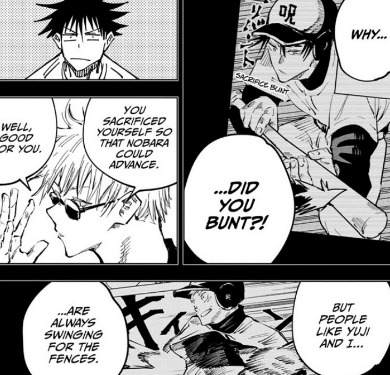
Megumi is your typical genius kid who everything comes so naturally to him he never learns to study, and therefore when moving up from high school to college begins to fall apart because he didn't learn the skills that would lead to his further development.
If you look at Megumi's situation, he should really be more powerful than he is. Megumi has the ten shadows, which is the strongest technique in the Zen'in, and apparently even capable of defeating a limitless user with the six eyes. Not only that, but he was handpicked and tutored by Gojo Satoru since he was a child, and he's clearly the student that Gojo takes the most interest in teaching.
Gojo and Yuta who have similiar natural talent are already at the level of special class at Megumi's age, and Yuta himself has only been a sorcerer for a year, but Megumi lingers at grade two. Gojo and Megumi himself are frustrated by his own lack of progression and neither of them can understand why.
In typical Gojo fashion, Gojo who only understands the world through the lens of sorcery, just suggests that Megumi get stronger at developing his ten shadows technique and everything else will work out. However, the reason Megumi can't advance isn't because he's not strong enough or not working hard enough, but because he's emotionally weak.
He falls apart mentally rather than physically, and we learn the reason why in his flashbacks to Tsumiki.
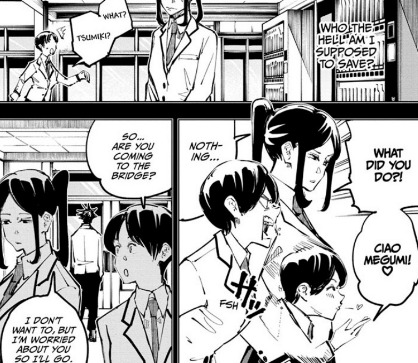
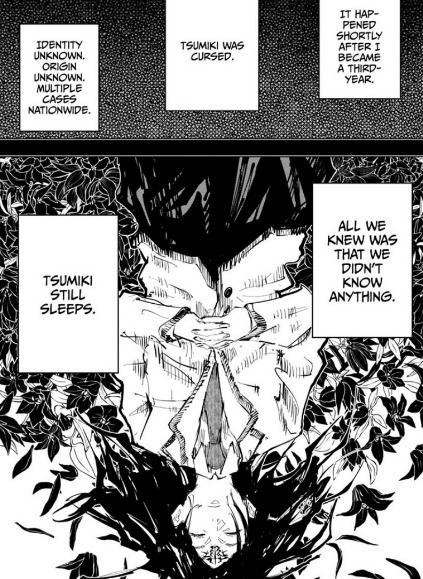
Megumi has no emotional reason to want to be a sorcerer, he doesn't even feel an obligation to save people does the way Yuji does, he was just groomed into it by Gojo. However, the loss of Tsumiki at middle school age makes Megumi falter, because the one reason he had for going forward is that he could possibly make Tsumiki safe because doing his job as a sorcerer gave them money to live... but then Tsumiki is out of the picture and Megumi is trapped in a life he doesn't want for no reason.
The difference between Megumi and Gojo that Gojo fails to notice, is that Gojo has an incredibly strong sense of self, and Megumi has no sense of self (which further inhabits his development). He's never once doing things for himself, despite calling himself selfish and espousing a much more selfish philosophy that Yuji does, his goals all focus around providing some kind of service or protection to others.
This is where Megumi's development starts becoming difficult to keep track of, because Megumi is a character who both changes a lot throughout the manga, and doesn't actually change at all. Which is a statement that makes no sense but let me explain: Megumi develops his ten shadows technique and on the outside is developing into a stronger sorcerer, but he never does the internal work and self reflection required to become emotionally strong.
Once again, Gojo in his great genius can only offer this advice to Megumi: Become strong, become a better sorcerer. This is because Gojo misses out that emotional issues are what is holding Megumi back. Megumi's first two major fights in the manga are losses, he's not strong enough to kill the curse on his own in the first chapter so Yuji eats the finger to help, he's not strong enough to stop Sukuna's rampage in Yuji's body, so Yuji dies in front of him.

It's two situations where Megumi reflects, "If I was strong enough, I would have been able to do X, Y, and Z, therefore it's my fault that this bad thing happened."
So we see Megumi throughout the arcs, continually developing his ten shadows technique to be stronger, while at the same time avoiding personal development. The biggest moment of this is origin of obedience, where he unlocks his partial domain expansion and then a few chapters later just avoids an emotionally difficult conversation with Yuji because he's scared to talk with him.


Megumi's desire is to feel free and grow into a better version of himself, but he stops at every opportunity to develop emotionally because that's harder. Gojo suggests that Megumi just pursue strength, so Megumi just starts finding himself in violence. Which is why the progression we do see in his character is him getting stronger and better at using his technique, coupled with him being more openly violent and more like his father the shadow of violence who is always chasing after him. This is what turns Megumi into Mr. "I'll totally kill people in the Culling Games if I need to."
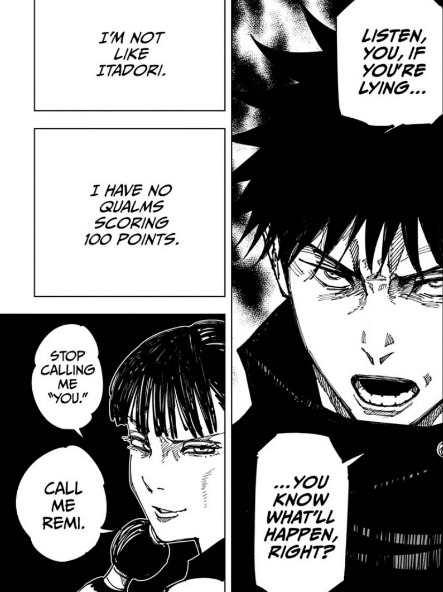
Would Megumi at the beginning of the manga been okay with slaughtering normal people to get points in a game, maybe yes maybe no but he does advocate for just leaving a prisoner to die to curses because they committed a crime once. If anything his development post shibuya is just exaggerating a side to him that was already there. Megumi in times of crisis falls back on violence for survival because that's what Gojo taught him.
Megumi grows more confident with his abilities, he uses them in more creative ways, he even starts demonstrating himself as a leader among the group basically coming up with the strategy for the culling games. He's also more emotionally open with Yuji than he was in the past. There's definite emotional progression.
Beginning of the manga Megumi is lacking in confidence -> Yuji dies in front of him, he realizes his need to get stronger and starts applying himself -> In the Kyoto battle arc despite training with the second years he still falls short in the battle against Hanami -> Gojo reveals to megumi part of the reason he has a mental block against getting stronger is because he's downplaying himself for the sake of others, and afterwards Megumi starts imagining a better version of himself for the first time -> Megumi shows his strength at cooperating in Shibuya, fighting with Yuji, and then later Maki and the rest against Dagon -> Megumi is the one who convinces Yuji to keep fighting showing his emotional development and comes up with the strength for the culling games -> Megumi uses his domain expansion again but much more confidently than he did in origin of obedience.
There's clear progression here on Megumi's part that I can even give a general summary and map out, but at the same time the fundamental problem has not been solved, that Megumi doesn't have a thoroughly developed sense of self and self destructs. Gojo even says as much that part of the reason he's so limited in using his abilities is because he thinks he has Mahoraga to fall back on.
He tries to use Mahoraga in the fight against Sukuna, tries to use it against Todo of all people, tries to use it against the special grade spirit in origin of obedience and this time stops himself (making progress) only to once again default to using Mahoraga in Shibuya when he's cornered. Megumi doesn't try to personally develop himself because he considers his own life worthless and that behavior never stops. It keeps persisting until we get all the way to Sukuna taking over his body, which happened because Megumi ignored every warning from Yuji that Sukuna was planning for something. Because in that case he just assumed Sukuna would kill him and Megumi doesn't care about that because he doesn't value his own life.
Which is where we get the great paradox that is Megumi, he's the most developed character in the manga with a great deal of the manga focused on both his slow progression as a character, but also revealing more parts of his personality that the audience would not notice at first. People who saw Megumi advocate for leaving prisoners behind to die in the first arc of the manga, probably wouldn't assume he'd go so far as killing people in the culling games to get point, because it's quicker that way and he can justify killing bad people, but that's the natural extreme of that behavior to begin with.
We see more and more of Megumi's repressed anger, and his abandonment issues with his sister and his parents, so his character is moving, but we also don't see a lot of progression on those issues because Megumi's not focusing on trying to be a better person just being a better sorcerer.
In typical shonen manga fashion, the focus is put on Megumi getting stronger and learning to develop his technique ore. In atypical shonen manga fashion, Megumi is actually punished by the narrative for only caring about getting stronger. Sukuna's possession of him, and his loss of Tsumiki are both things caused by Megumi being ignorant until the last moment and keeping himself hidden in the shadows too, if he'd valued himself more he'd have steered clear of Sukuna and Yuji because of the danger, if he'd paid more attention to his sister he'd notice Yorozu in his body.
Which is what makes Megumi so unique, but also a little hard to understand because he is in so many ways a typical shonen jump character, and in other ways he's nothing like them because he's just Megumi.
108 notes
·
View notes
Note
Hi! I'm the same anon as last one who read your 'Change of clothes' (can I be your anon? i'll take any emoji)
So I had a spiritual epiphany which was sparked this morning after going through my notes of states posts (yours as well as @neobora and @remcycl333) and I wanted to share. I think the non-duality concepts finally tied in for me.
This is my epiphany:
I think the true purpose of manifesting as humans is to realise our true selves as infinite beings. To remember & reclaim our limitless power and transcend from the limitations and illusions of the material world we were born into. When you truly understand the law and can practice it well, you are no longer a slave to the material world and its rules. You are unshakeable because you know you are far greater than this temporary shadow. You realised the truth that your reality is whatever you choose it to be, through your awareness. And the process of coming to this realisation, of reclaiming our power, is the awakening & liberation itself. The desire for material things was only the carrot on the stick that led us to learn to manifest, to exercise our power, never the true end goal. The true reward is knowing we are God. We always were and always will be but we needed to remember. And this is how.
Thank you again for your lovely posts. I never thought I'd finally 'get' states but I think I do now. I now read loa posts out of interest & as a reminder of my own power, no longer looking for *the* thing that's finally going to get me what I want. It's always only ever been within me. I can't look outside to fulfill it.
Funny thing is I actually manifested through states a year ago with a few things I didn't care about. I was like 'oh I'll give what I read a try" without any expectations and I realise now I executed it perfectly. The reason I overconsumed, spiralled and couldn't persist when it came to "big" desires is because I was still identifying with the outer man in the material world which falsely believed that it had to work hard to get "big" things it wanted (hence thinking I had to constantly be thinking or doing something about it like doing methods & routines to have it); I hadn't actually realised my true self and true power and identified with it.
Now I know it's accepting that state of being within you, identifying with your inner self (the infinite being) and dismissing the shadow that the 3D is. I also want to credit/give a shoutout to this reddit user Own_Ad7567 who is a shifter as they contributed to my eventual epiphany. I realised shifting is the same essence of what is talked about here, it was very fresh, interesting & eye opening to read about the law framed in yet another way. Their post 'For those who struggle with doubts and focus problems' in particular is really good but all their posts were fun to read! They said:
"Understand that your 3d, or physical reality (basically what you perceive around you) is the least real part of reality. It is just a projection of the 4d. Like a cinema: what happens on the screen is just a projection. If you want to change what's being projected on the screen, dont focus on changing the screen, change the film and the screen is quickly going to be showing something different
I know on loablr the most used analogy was the mirror & face but it never really clicked for me until I read that! And then afterwards I read @neobora's 'Through a different lens' post & it just solidified my understanding.
Wow I'm amazed at how long this post is. Maybe it will help someone else too. Thank you again for your writing all those posts and answering all the asks. I still haven't read most of it but that's just how impactful your posts are. I gained a lot of clarity just from reading a few. I am truly grateful to you, @neobora, @remcycl333, Own_Ad7567 and everyone who shares their understanding of the law. Thank you guys!
You are absolutely amazing, anon! Thank you for your kind and sweet words, and your wisdom. I hope this helps sb put there too and I'm certain that it will. I'm seeing it more and more everyday in this community, despite us having upset and downs. I'm proud that you've finally reached peace in your journey like this, and I'm honored that you let me be part of it, along with the other bloggers
You can be my anon is you wish, I'm not very active here but would it be ok for now if you went by an initial or nickname?
#law of assumption#affirm and persist#manifesation#manifesting#neville goddard#3d#affirmations#loa#loa methods#void state
102 notes
·
View notes
Text
Raphael as an Autistic Character
I recently went over this in an ask I received, but I thought this deserved its own standalone post. As an autistic person myself, I wholeheartedly believe that Raphael is the most heavily, yet most realistically, autism-coded character I've seen in media.
I've seen it the "Raphael is autistic" headcanon floating around a couple times, but I think he deserves a full breakdown not only on why he's autistic, but how it impacts and explains his character. Because just like with real people, it's one thing to just toss a label onto him, and it's another to understand how this impacts him as a person. I think a lot of the stranger or more unlikeable parts of his character are much more appreciable when recontextualized through an autistic lens.
So, here I go. Down the list of symptoms Raphael displays, starting with sensory processing symptoms and moving into social-emotional symptoms.
Sensory Issues: Hyposensitivity
When it comes to sensory issues, the elephant in the room is his sense of taste. Raphael has a hyposensitivity to taste- meaning he perceives taste to a significantly lesser degree to most people. This is clear when he consumes Solomon's food without being disgusted at the taste- as well as several other occurrences of weird taste, like absolutely dousing his sandwich in Hell's hottest hot sauce.
But it isn't just that he doesn't perceive the taste- he actively enjoys it, moreso than other foods. I think this is because, with his dulled sense of taste, "normal" foods taste bland to him. Something to the degree of Solomon's cooking is the only thing powerful enough to give him the kind of sensory feedback most of us get from "normal" food. Which is why he enjoys it.
I don't think it's just taste that he's hyposensitive to, either. He also seems to have a very limited sense of pain. In Season 4, Raphael is seen accidentally catching his hand on fire- and not even noticing until somebody else pointed it out to him, at which point he simply described it as "hot". I'm sorry, having your hand on fire isn't just "hot" like a summer day, it's searing agonizing pain. The fact that he was this nonchalant about it, when we've seen other nonhumans like Mammon respond to pain (and even being on fire) perfectly normally, says something. I think Raphael's lack of pain perception could also contribute to how violent he is- if he doesn't feel pain the same way most people do, he might not fully understand the weight of his harsh punishments. What he'd consider the equivalent of slapping someone's wrist with a ruler could be literally stabbing someone, we don't know.
Sensory Issues: Visual Processing
Raphael, like many autistic people, seems to be a very visually-oriented person. This was highlighted multiple times in the Devilgram "Raphael's Welcome". The first time it was shown was when Raphael refused to eat food Lucifer recommended due to how it looked. This is the same angel that eats Solomon's cooking with absolutely no issue, and yet gave a hard no to anything Lucifer offered him because it looked a little funny. His priorities are way out of wack. Visuals seem to be a very powerful influence over how Raphael thinks and feels, and this is very in-line with the autism spectrum.
The next time Raphael's visual fixation was brought up in the Devilgram was when he entered Majolish. The first thing he did was start looking at all the clothing up close and pointing out details about how they were stitched, the quality of the clothing, etc- to which Lucifer remarked that Raphael has always had an eye for detail. While Raphael is oblivious to or actively avoids other types of sensory input, visuals seem to be very important to him and how he understands the world.
Sensory Issues: Hypersensitivity
This one is going to be shorter than the others, because I really don't have as much evidence for it nor as much to say about it. But I do suspect Raphael to be hypersensitive to sound. Again in Season 4, when MC was looking for Raphael, the first thing Lucifer told them was to look for the quietest place around. While a lot of people prefer quiet, how on-the-nose Lucifer was with this combined with Raphael's more obvious autistic traits makes me suspect he might be hypersensitive to sound.
Communication Deficit: Social Cues
You know it's bad when Mammon tells you to read the room.
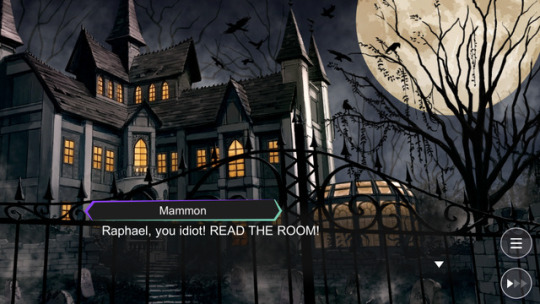
Honestly, I feel like that should be all I have to say. But you know what, I'll go on.
Raphael has repeatedly shown that he has very little understanding of social cues. He's somehow made it this far without catching onto the fact that everyone is terrified of Solomon's cooking, for example. He also once compared Satan to Lucifer after literally everyone in the room tried to warn him not to.
Raphael doesn't even seem to be aware of his own social cues and the impressions he gives off. When Diavolo announced that he'd be working with Thirteen, Raphael scowled and shook his head- only to seem genuinely surprised when Thirteen noticed this and took offense to his reaction, telling her that he "didn't say anything".
His understanding of social cues is... not very good. To say the least.
Communication Deficit: Emotional Expression
One of the first things we learn about Raphael is that he's incredibly difficult to read. It's not hard to see why other characters feel this way- the majority of the time, he has a completely blank expression. Hell, one time he flat-out said he was having fun and didn't even smile about it.

Smiles in general seem to be excessively rare with him, and it's often made a big deal of when he does.
Despite his lack of expression, he doesn't seem as emotionless as people portray him as. According to Simeon, he's actually "pretty intense". Even in the screenshot above, he's clearly feeling something, he just isn't showing it in the way a typical person would expect. He gives all the hallmarks of someone with very strong emotions but an inability to translate them to others- something very strongly associated with autism.
Communication Deficit: Speech
One of the other things we were told about Raphael before we met him is that he's incredibly quiet- to the point where others, including Luke, have difficulty understanding him as a person. Reading through the lessons, he has "..." dialogue significantly more than any other character. It's rare the game goes out of its way to include silent dialogue, and usually when it does it's in a very serious situation where it's meant to be emotionally impactful. This isn't the case with Raphael. He does this regularly, in casual personal interactions, and even to the point where it causes miscommunications with others.
An example I can think of off the top of my head is when he went to clean up a mess Thirteen created with her spiderweb bazooka. He left in the middle of a conversation to go do so, without giving any verbal acknowledgement of what it was he was doing, leading to Lucifer assuming he was goofing off and scolding him. Normally someone would say something along the lines of "we should clean that up", or "let me go clean that up real quick", or "I'm going to go clean that up", etc. Most people would say something like that without even thinking. But Raphael just gave his usual "...", and that socially inappropriate silence lead to a clear misunderstanding with Lucifer.
"Quiet" to the point of impeding on one's ability to connect with and communicate intent to others isn't normal, and it makes me wonder if he may be partially nonverbal.
Communication Deficit: Tact
Raphael is... not tactful. At all. He's incredibly blunt, even harsh, with pretty much everyone. It's so constant and grating that angel Lucifer stated that he actively avoids Raphael.
Given his other very clear social difficulties, I have to wonder just how much of Raphael's rude language is actual harmful intent and how much of it is just that he's awful with tact. I wonder how much he really meant all the dickish things he's said to the brothers.
It certainly puts his character in a different perspective. As does a lot of this. Which is why I wanted to elaborate this far on all of it instead of just throwing out autism symptoms and giving him an "I'm autistic and I think he is too" seal of approval. His character starts making a lot more sense when you look at it through this lens.
And now, of course, the obligatory Michael comment of the day.
(I'm sorry, you know me by now, I couldn't not.)
I think Michael is autistic too, and I'm mentioning it here because this ties directly into Raphael and his autism. It's said in Raphael's introductory video that he's "the only one who truly understands Michael". If Raphael is autistic, and he and Michael are on the same wavelength so to speak, it would make sense that Michael is too.
I think they're on opposite sides of the spectrum- Raphael is the cold/distant/withdrawn, deadpan, hyposensitive, partially-nonverbal autistic while Michael will turn out to be the hyperactive, overexpressive, talks-your-ears-off-about-special-interests, way too in-your-face due to lack of social cues, sensory-seeking autistic. Two sides of the same coin.
They'd both play into the double-empathy theory, that autism miscommunications are due to a mismatch in autistic-neurotypical communication methods and that two autistic individuals can generally communicate just fine.
#obey me raphael#om raphael#obey me#omswd#obey me character analysis#neurodivergent headcanons#obey me michael#actually autistic
44 notes
·
View notes
Text
The “Protagonist” of Underverse 0.7 (Part 1)
Now, this is an interesting one. This is also a hot take, potentially, and maybe a bad choice of words- “protagonist” typically suggests a main character and Underverse is a series where a true one main character is hard to pin down. I’d say Protagonist is definitely the wrong word actually, thinking about it- but I’m not sure how else to phrase this…
Maybe it’d make more sense to call them the battle perspective. That is, the person you’re meant to be rooting for in this battle, and the person who’s side is followed closest throughout the conflict once it gets rolling.
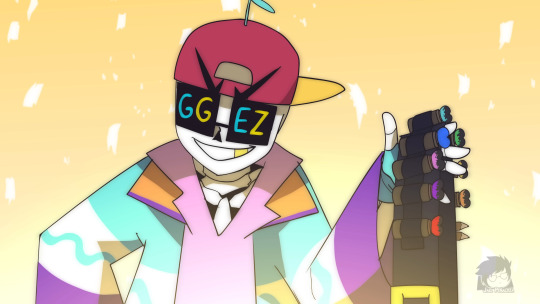
Let’s talk about why in the WORLD I would think the character in this role is FRESH, and not Ink.
LET ME ALSO MAKE IT CLEAR NOW. I’m not about to suggest Fresh is the next main big character in Underverse or that he’s going to be saving the day or anything of the sort. If anything, I think now, he’s basically going to disappear until maybe the very end to show up in a final shot of some kind exactly the same as he was. (I would love to be proven wrong about that but I doubt it.)
I’m talking exclusively about the second half of Underverse 0.7 Part 1 that takes place in the Antivoid/Doodlesphere, specifically the conflict that happens in the doodlesphere. So just the parts Fresh is there for. Everyone clear on that? Yeah? Alrighty.
So, how could I possibly think FRESH is the main perspective on this battle and not Ink!?? Ink is present for all the conflicts much more directly as the focus, is the one who has a character arc in the episode, and has been super important for basically the entirety of underverse what with his connection to X Gaster and everything else. Ink’s TOTALLY main character material while Fresh is super background!! Surely this is me actually being out of my mind right?
Maybe. But hear me out, because I’ve got some interesting evidence for this.
Point 1: How Fresh arrives

Fresh shows up to the scene as one part of a duo with someone who is undoubtedly a main character, Cross. This still signs him up as a sidekick more than anything, on its own, but there’s more to this than that. Specifically; The Gift. AKA, Fresh’s Payment for the favor he did Ink, something Cross doesn’t know about, but has been used in promotion and as a symbol of this episode for a while now.
That Gift has so little to do with Cross that he didn’t even get told what it was in vague terms by Core, all Core said was “Don’t worry about it, just go,” even though Core could have answered that Cross was going with Fresh of all people because ink gave him a promise, or a gift, or a favor, or something of the like.
Cross is also kicked off into what we find out to be Aftertale within the first few minutes of showing up- I think it’s safe to say that for this episode, Cross is not a focal point for the part of the video I’m focusing on here.
There’s also what Ink is doing when they show up. Besides, y’know, being thrown around like a wet sock by Error.
He’s holding the gift and looking for Fresh.

He’s PROTECTING that gift very very hard. To the point of when error was throwing him around, his focus was on making sure he did not lose that gift, even despite losing his vials in a blast soon after this. Ink didn’t remember what it was initially! But when he realized that was singularly his focus; Get this gift to Fresh.
Error is obviously an antagonist here who is preventing Ink from delivering that gift to Fresh. Also not consistently present- definitely showing up multiple times, but not there the entire time. You love to see him throwing a fit about the lack of spotlight only to hilariously still be losing the spotlight to, of all people, Fresh.
We can tell that everything here is centered around Fresh and ceases to function without him here, but there’s a much more compelling reason why I think Fresh is meant to be the focus here and the lens through which we view these battles.
Point 2: The Vials

These are Ink’s Vials! Yes, I can hear the confusion starting again. These Vials, however, are what keyed me into the fact that Fresh is the one we’re watching, not Ink. If this graphic hadn’t existed then I wouldn’t have realized it myself- but they work in a very peculiar way in this fight/chase sequence.
Fresh, currently, has all the vials. He’s playing a game of keep-away with Ink, skateboarding away with them to keep them out of his hands, meanwhile Ink is trying to attack him to get them back, and drink them.
This graphic is pretty unnecessary if it was solid. You can know the colours of the vials if you look at inks design, so it’s purpose isn’t apparent until a few moments later, when Fresh tosses out the Green and the Yellow, which are then caught by Ink…
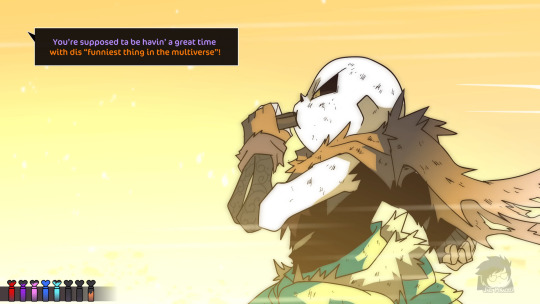
Who drinks them. Regular Ink behavior- but now we see what the vials are there for! Ink drinking them emptied them, marking them as no longer a piece in play, completely greyed out.
…That doesn’t make a lot of sense, does it?
Ink is trying to get the vials back from Fresh. If the visual was trying to keep track of how many Ink had gotten back, then all of them should be unavailable until Ink has them. Especially given at this point, Ink is being actively taunted about a variety of things I’ll dig into more in other posts- but that needless to say are encouraging him to magically pursue Fresh.
Perhaps they’re simply keeping track of how much material is in each vial..? But that would also be odd, wouldn’t it? Why would Ink need to keep track of which vials are full or empty? His magic isn’t tied to the colours he has access to, and the vials don’t change when magic is used by Ink, just when they’re drunk. Not to mention, Ink doesn’t have those vials yet- Fresh has them.
And you know who would profit from keeping track of their volume, and which ones have been consumed? Fresh would. It's VERY important that Fresh keeps track of which ones Ink’s drunk, for reasons that are made clear later. HE is the one that is making that visual matter- and it’s tied to HIS goal, not Ink’s. We’re seeing his side of this battle, the side where he has to know which vials are empty for the last part of this battle.
When the vials are no longer a checklist. They’re a timer.

These Vials, in the latter half of their fight, become a timer that goes down at a steady rate over the next few minutes. This timer is very very obviously for Fresh specifically, marking how much time he has to be in control of ink’s body. Anything he wants to do, he has to do it before he runs out of the material now in those vials- making this graphic undeniably one that applies to Fresh specifically, not Ink.
Why does this matter? What’s the point of knowing who’s perspective we have on this battle when we’re watching from the third person anyways? Well, for one it’s cool as heck to see this and ponder it, but for two; it’s so that the shift to Fresh!Ink isn’t that strange or jarring. Having Fresh take over the main character and perspective of the battle would be odd, and would mean forcing your main character to take a back seat. It’d mean Fresh was actively uprooting something planned and prepared before and causing a disruption.
That’s no good! But that problem goes away if Fresh was always the focus. No need to shift perspectives, no need to see how Ink feels while being possessed, none of that. Fresh is the one who’s in the spotlight- and this is further accentuated by how he acts while possessing Ink. He’s not talking to Error, that’s for sure, and he’s at best kind of talking to Ink, maybe.

That’s not actually it though. No, he’s talking to us, full on PSA mode, turned towards the camera and giving a guide on how he plans to win as he proceeds to. The spotlight on him makes overwhelming sense, with that- and it’s EXACTLY the kind of thing he would want, maybe even fitting payment that he decided to take for himself when Ink’s gift was so sub par.
He wants us to pay attention to him. He wants to be seen, to be remembered, to be adored and to exist without question. Because that’s what it means to be a character. That’s how you continue to be there, how you keep from fading away into irrelevancy- how you end up getting replaced, and written out of your own life.
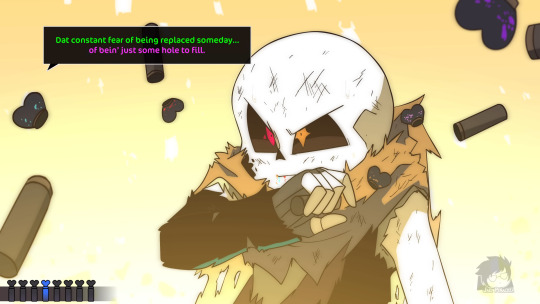
And he is terrified of being replaced. He would do anything to keep himself important enough for us to care about.
Maybe the gift was the funniest thing in the multiverse after all. An opportunity for Fresh- ridiculous, overshadowed, often misunderstood and ignored Fresh- to temporarily take the biggest spotlight possible from one of the main characters of the series, asserting himself in legendary, radical fashion as an essential part of this otherwise very serious high stakes story that cannot be overlooked or replaced. Because you have to admit, THAT is hilarious.
#fresh#fresh underverse#underverse#underverse 0.7#ink#error#cross sans#fresh!ink#truefreshinfo#This one is very speculative I'll admit#but it's cool to speculate on#and also I feel like I have something here#Surely it's not just me
191 notes
·
View notes
Text
Rue's current trajectory is so heartbreaking to me for a few reasons and I want to try and put it into words. I've been trying to grapple with exactly how much power rue has in the fey realm for several weeks at this point. They come across as very powerful, but see so little of it in themself that it is really hard to get a proper judgement - especially in the context of other fey who are in some ways magic or physical prowess incarnate that to be powerful is the norm at the Bloom.
They clearly envision a world without courts, without boundaries, where everyone can live freely and openly as themselves without worry for politics and power wars and the strife that comes from being within a court. But there is a distinctive problem with this, and it is that they cannot grasp why someone would want to be a member of a court at all. On some level, they seem to equate the power that a court wields over its subjects to an untenable level of control or violence that needs to be resisted. They want to remove the influence that the courts have on people and their lives. But this doesn't account for courts who aren't structured on models of power. Or who have less than the bigger courts.
The way that I understand it, the union between grebalba and apollo was an incredibly advantageous one for the goblin court. It was finally going to give them a chance at joining the bigger courts that normally wouldn't have given them a glance, and it was all in thanks to Hob's considerable military prowess. Blemish and Boil have actually seemingly managed to achieve a similar feat in the engagement between Hob and Lady Sylminar. Either way, their clear goal is to finally gain upward mobility amongst the fey and be respected as a peer.
Rue looks at these political alliances and sees them purely through the lens of happiness, joy, and individual fulfillment. They see hob miserable to have Lady Sylminar on his arm but willing to do it for the sake of duty. They see Apollo and Grebalba, only to be wed for politics and the gains of their courts. And they step in and try to upend it for the sake of upholding their own beliefs and values. It is not wrong to wish that people would think of themselves before duty, not wrong to wish that this duty was unnecessary in the first place. But in the process they fail to see the wider picture. When the engagement between Apollo and Grebalba is overturned, one of them has more to lose than the other. This is not two equals in a loveless match that can just go and find someone else of similar standing, because the entire point is that they are unequal and a marriage between them would bridge that gap. When the engagement is broken, one is going to remain unchanged, and the other is going to lose years, decades, maybe even centuries of slow progress.
When Rue wields their power in this way, trying to see out their own vision of a world without courts and borders between people, they are inherently looking at the other fey through a very privileged and specific stance. They have the freedom to leave and go off without being held accountable for it; the power to essentially do what they want (yes, within certain parameters that they have begun to push against, but they've still been given a *lot* of freedom). The vast majority of fey are not capable of the things that rue does though. They are very much a high fey, removed from the lesser fey that make up the majority of all courts. And their unwillingness to subscribe to the power dynamics of the courts results in them being unable to see how sometimes a person doing something out of duty creates a greater amount of good and social change than them looking out for the interests of that individual.
Do I want to see a world where these violent power structures aren't held over people's heads and force them to make difficult choices that put themselves aside? Where people aren't exploited or manipulated by those in power and can live their lives as they please? Why yes I do. I adore rue's vision and how it will completely decentralize the current ways power is held and guarded by only the most elite fey. But right now, rue has enough power to interfere, but they do not have enough power to reform the system as it stands. And within the system what they have done has only resulted in reaffirming the existing powers
#acofaf#acofaf spoilers#a court of fey and flowers#I still feel like this is a mess of thoughts but I cannot stop thinking about it#rue exists in such a place of privilege#and even as they work to undermine the system they have still only maintained the power of the elite through their actions#I love their ideals so much#they are looking for the most radical amount of change in the entire cast#but they need to do something transformative and not just exist within the system or they're going to be upholding established power#delloso de la rue
339 notes
·
View notes
Text
Fitz Stellar lune Analyzation Prelude
So, this one may be a tad bit long.
So, I am going to make a series dissecting Fitz in Stellarlune. This is the lens through which I look at Fitz, for context.
Stellarlune was definitely...something, for Fitz. It sort of made me realize certain things about Fitz that I hadn’t before and was both on brand for his character and completely threw away his character at the same time.
Overall, In this book Fitz was completely demoted to the role of love interest and all of his other wonderful character traits were just thrown away. His telepath skills were there but what else is new?
There was no insight as to how he’s truly dealing with the hatred of everyone at Foxfire, nothing on his relationship with his parents after the craziness of Flashback (haven’t even seen Alden since flashback. Not complaining but), nothing more on how he truly feels about Alvar being partially dead because of HIM (other than that he’s mad about it), or if he still feels that suffocating Vacker Legacy.
Stellarlune gave many inklings as to how he’s taking things and developed his character for sure, but they felt almost empty and almost antagonized him if anything.
This is all because of the series being written from Sophie’s POV. There’s absolutely nothing wrong with how Sophie feels about Fitz. Relationships (of all kinds) are complicated, and one of my favorite things about this series is how painfully realistic it is when it comes to the relationships. The messiness of it all is so realistic for how it actually is for teenagers.
It just...really doesn’t do Fitz any favors when someone who’s a huge DOORMAT (I love Sophie don’t worry) is the one describing someone who can be such a blunt little PRICK (Fitz is my favorite character). No wonder he’s painted in the light that he is in this book. If he wasn’t, it wouldn’t be in character at all for Sophie.
Unfortunately, you have to be able to read inbetween the lines and do some extra thinking to get the actual meaning of what Fitz said and did in this book.
He’s like a riddle that you have to chew on before you get the meaning. Or a taylor swift song. At first you think “this is so untasteful”, but then it gets stuck in your head and listen to it again and again and notice all the touches and effort that went into it. Then you appreciate it, and enjoy it.
Fitz is so hated because he’s just. He’s an absolute character of a character. it’s hard to remember everything in such an intricate series, but it’s very important to remember everything that has happened to Fitz and what his POV is from the beginning of the series to Stellarlune in order to understand his character. His ENTIRE world is pulled from under him, he’s never given the space to express his emotions, he’s lived believing that his worth is tied to him being useful and achieving things. There are SO. MANY. parts to dissect about him it’s stupid. He’s a mess of conflictions. Family, or friends? Vacker Legacy, or improve Lost Cities? Romance with Sophie, or friendship with Keefe? He shifts back and forth all the time throughout the series.
Here’s my take on his personality. He’s blunt as heck. Very little thought goes into what he says. He actually becomes increasingly blunt throughout the series. For that reason, I think it’s important to remember that not everything about what Fitz says should be taken so seriously. If very little thought goes into what he says, very little gravity resides in his words. Thinking of all the blunt people I’ve known, their actions and tone and simply getting to know them reveals how priceless they can be. They can be hard to swallow, but loyal to the core and so, so caring. Remember:
Fitz loves to bake.
Fitz loves giving gifts. He even has a mini gift giving arc. He went from giving Sophie a stupid boring pen to getting her new, unique gifts every day when she was having a depressive episode in Nightfall. That painting was a huge fumble though.
He legit has ten pairs of the same fuzzy pjs. Like what.
He’s really a huge dork. Like, the hugest dork. He literally sat with his sister at lunch for a while before Keefe.
Rambling king. He rambles all the time. He’s so awkward about it to.
Sophie has described his hair as looking like a “rockstar”. His hair looks like a rockstar. He just. He.
He loves sweets. Remember those dry cookies in Legacy? Remember how he kept eating them? Remember the ripple puff he devoured in one bite in book five? He’s got a sweet tooth
He liked having green spikey hair. Fitz was calmly eating his breakfast with green hair and only changed it because his mother made him.
He likes holding people’s hands.
Sophie found Fitz reading a TEXTBOOK for FUN in book one. He likes to read. he probably already knew how to bottle wind but he was still readin’ that “ways to catch the wind” book anyways. Just curled up on the chair readin’ it.
Fitz gave Keefe a pep talk in Unlocked, telling him that accepting help isn’t weak. It was so inspirational and touching.
He actually sleeps with a stuffed animal. For that matter, Alvar confirmed that he’s a little cuddler in Neverseen. He’s a little snuggler cuddly guy.
he went with Sophie to get gelato for his friends. In the middle of a crisis. He just dropped everything to get ice cream for his friends.
He literally has a box of souvenirs he got from the forbidden cities. He got little mementos every time he went looking for sophie.
He also tried to save a pigeon. Just, he just saw it and had to help it. He got chased by other little kids and probably hit by flying sandals for it.
I believe it mentions at some point that he had to get tutors because of how much school he missed looking for Sophie. He had to put in that work to become top of his class. Do you know how mentally destroying it is to be top of your class? He’s just very competitive.
Fitz has a limp now.
He dive rolled to push Sophie out of harm’s way.
He carried Linh when she was tired in Nightfall.
he likes dinosaurs and dragons.
Biana is canonly graceful, so when Fitz said that he catches Biana all the time because she’s clumsy in book one, Fitz was just making stuff up for Sophie’s benefit. Silly.
Personality wise, Fitz is a very feel-y feeler. He’s a huge nerd and very smart, yes, but he’s very driven by emotions. He’s very dense as well. And prideful. He’s proud of his achievements. Those are just his traits. All put together, can he be unlikeable? Oh absolutely. But, if you just accept his very REALISTIC and well rounded character, he’s a gem.
With this mindset (in the next post), let’s dissect Fitz in that Rayni face reveal scene!
#fitz vacker#kotlc fitz#kotlc headcanon#KotLC#kotlc alvar#kotlc rayni#kotlc stellarlune#kotlc keefe#kotlc sophie#sophie foster#Keefe Sencen#kotlc shitpost#kotlc theories
62 notes
·
View notes
Text
re-reading chapter 61 in the hopes of finding more info on the communication faries (there doesn't seem to be much) and oh look! that's also the "kabru and mithrun get stuck together" chapter
u want some kabumisu thoughts
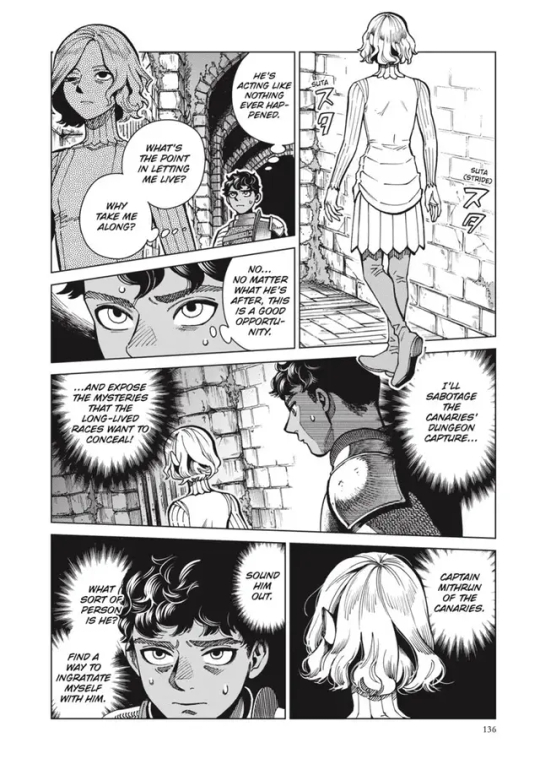
kabru is trying to pick mithrun apart to best ingratiate himself so he can then sabotage the canaries' attempt to retake the dungeon before laios can defeat the lunatic magician. typical kabru solution to a problem; he knows he's not as good of a fighter as he is a manipulator. he also doesn't trust mithrun, nor does he think mithrun trusts him. the best course of action is to get mithrun as close to trust as he can for a good chance to strike.
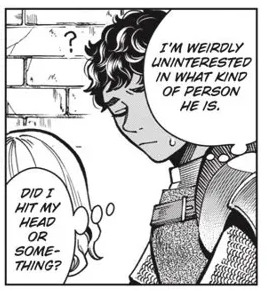
...but he's finding it hard to do. it's not compelling him the way this sort of task usually does, even if it's his only plan.

even so, when they run into a shapeshifter, kabru's version of mithrun is physically identical and its personality seems the same as well. kabru's skills of observation are not to be taken lightly.
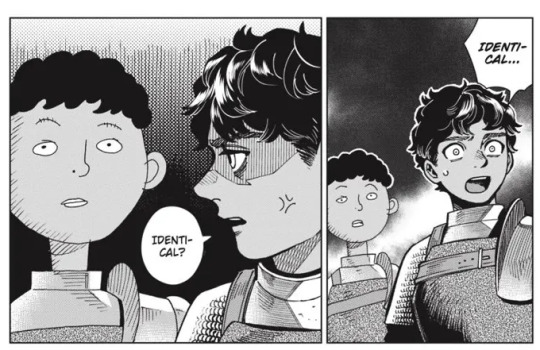
(mithrun is not even remotely skilled in this department. i imagine the way his trauma has changed his view of the world is also involved though)
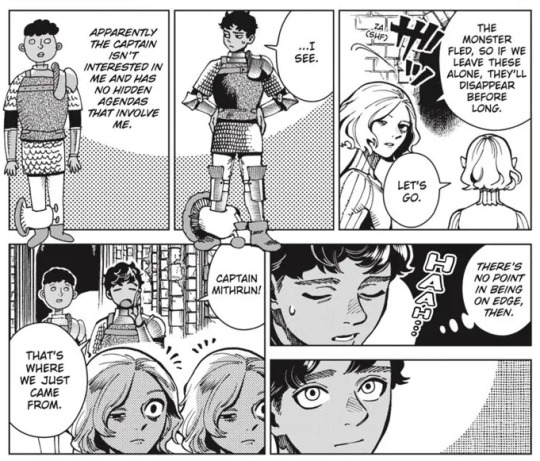
besides being a funny gag, mithrun's evident disinterest in picking kabru apart as a person calms him down. this is when he starts to see mithrun less as a threatening enemy and more just... a kind of strange person.
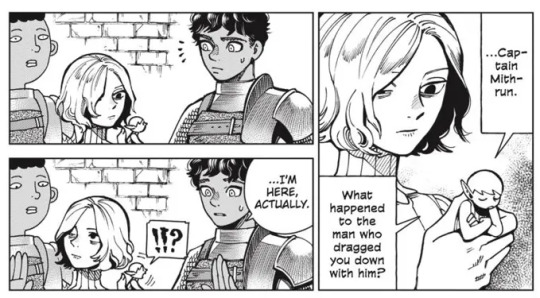
i don't have much to say about this one, it's just really fucking funny. he doesn't even realize that scribbly version of kabru is wrong. i assume his vision isn't the issue here; like yes it must be limited with only the one eye, but that's not limited vision, that's "my brain doesn't parse the world the way other people's do". mithrun TBI real. anyway
(i'm trying to talk about kabumisu so i'm not gonna post all the fucking hysterical panels of kabru lamenting turning into laios if he has to cook monsters, but. go re-read chapter 61 if you haven't recently, it's very good)
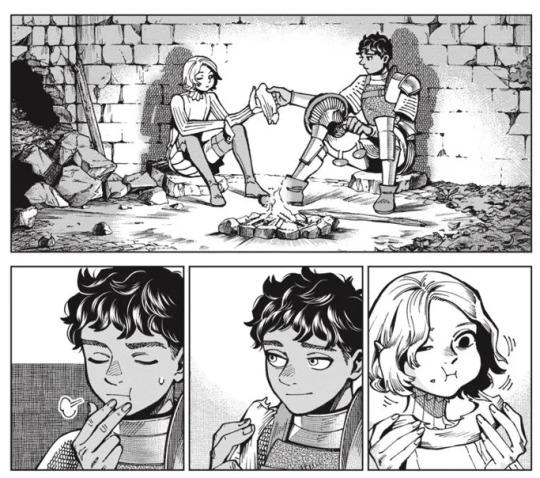
not to read too much into an adorable smile, but i think seeing mithrun eat like a child is endearing kabru to him a lot. it's getting harder and harder to view him as an enigmatic adversary. sure, there's plenty of mysteries surrounding him, but he's also just... not a very scary person, nor does he hold ill will towards kabru. he's not an enemy.
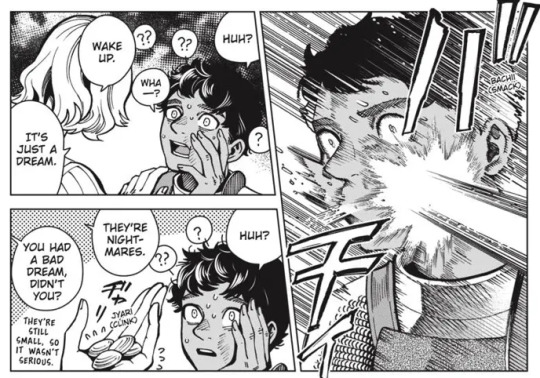
mithrun saving kabru from nightmares after they eat is probably another point in his favor (even if he smacked kabru to do it). kabru doesn't know yet exactly why he's been told to tend to mithrun--why mithrun needs tending at all--but mithrun being willing to protect him in turn certainly implies he's not resentful of the arrangement.
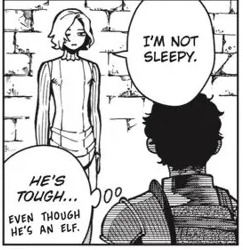
mithrun you are so baby
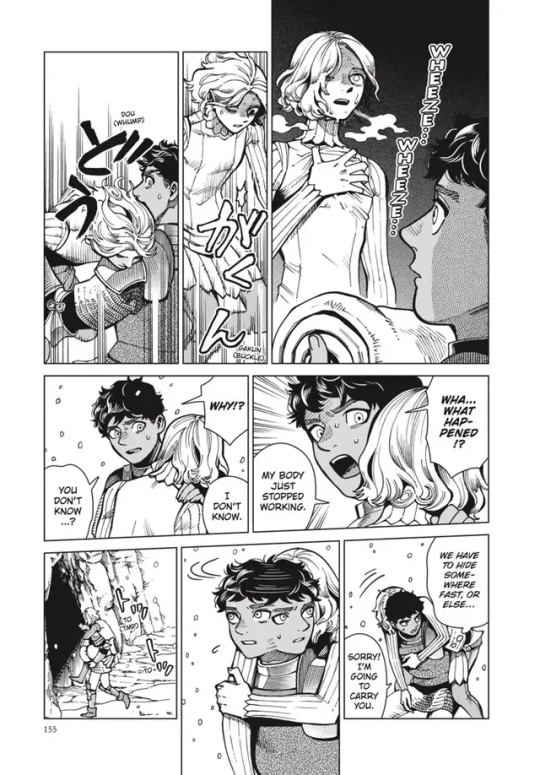
talk about ship fuel... but on a more serious note, i really love how kabru jumps into action here. it's very in-character for him, but also it's just a good show of what that character is--he's already pushing himself to go above and beyond for a man he didn't want to be stuck with in a situation he didn't ask for. i think he's already fond of mithrun to some degree by this point, but even so... his concern is evident, and it's not self-serving. kabru isn't trying to keep mithrun alive to further his own goals... he's trying to keep mithrun alive because he's a person and he deserves to live. we know kabru has no qualms with murdering people if they're "bad" (and what that says for him and his perceptions about when it's okay to choose life or death for someone else is surely an entire post on its own), but he doesn't want mithrun to die nor does he think mithrun is worthy of death in general.
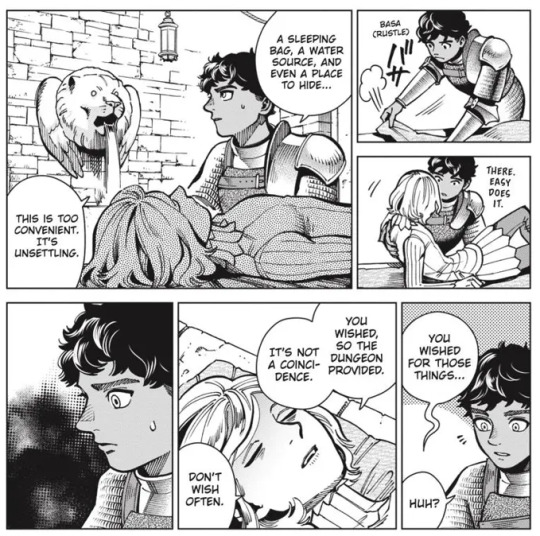
anyway this is why i stopped reading and started making this post. kabru wished to care for mithrun so bad that the dungeon answered his call. the way mithrun says this, it implies this isn't just a normal desire; the dungeon would be granting wishes all the time in that case. (however, through his lens, we for sure can spot the many times it has helped the touden party). the desire here was just that strong.
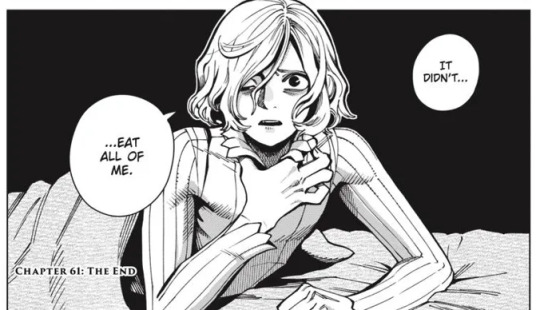
haha do you remember when mithrun reveals his true remaining desire at the end of the manga. remember how he didn't know before the fight was over. that he thought it was revenge he wanted. but actually it was for the demon to finish him off. haha. i just think
anyway kabumisu good. and this is only the beginning of their dynamic!!!
12 notes
·
View notes
Text
an interpretation of kieran’s mental health in the indigo disk
One thing that’s me very consistently while playing through the Indigo Disk DLC is how Kieran’s behaviour, though erratic, feels horrifyingly believable through a certain lens. Many of his behaviours are painfully reminiscent of my own memories of having anorexia nervosa—and while that’s absolutely not the sole reason someone could break down into an antithetical version of themself as dramatically as Kieran does, I think that as a reading, it can actually coexist very nicely with the actual plot reasoning of ‘competitive tunnel vision’. If anything, it would complement his competitive frenzy quite effectively.
I’m aware this is a risky and hyper-specific interpretation to share, but I’m posting my reasoning beneath the cut, since I think it’s worth sharing not just as a reading of Pokemon, but also as an intersectional look at ED pathology that doesn’t focus so much on either food or figure. Every time I’ve headcanoned a character as anorexic, it’s been because their behaviours seemed painfully perfectionistic and inflexible (see Seto Kaiba), rather than because they looked a particular way. Obviously, massive trigger warning for discussion of restrictive EDs as attempts at self-destruction.
(n.b. None of this is necessarily based on what I've read in scientific papers so much as on experience and observation of others with this disease. As such, if this feels a bit Freud-y-mumbo-jumbo-y, it probably is.)
Let’s start by looking at where Kieran starts out. In Kitakami, he’s stunningly isolated at the best of times. He thinks in extremes—good, bad; hero, villain; strong, weak. His relationship with his sister isn’t bad, per se, but she’s tempestuous and brash, whereas he’s sensitive and fearful. Her attempts to protect him from the worst of the world reinforce his sense of weakness—she shelters him in the harshest way possible, simultaneously expecting him to be tough enough to bear her toughness and weak enough to be able to tolerate nothing else. And though he attends a specialised school for battle, he’s long been the designated weak sibling; as such, he cannot, by nature, be considered admirable at Blueberry Academy. At home and school alike, he feels less than, and desperately lonely.
To cope, he renders weakness and loneliness as part of his identity, and latches onto the idea of Ogerpon as a courageous outcast, rather than as a villain. It’s an awkward, immature means of coping, as its sole mechanism of granting him any sense of worth further entrenches his isolation and inferiority complex. In defying conventional wisdom on local mythology, he’s choosing to distrust others’ judgement, cutting off any chances of accepting others’ approbation, and locking himself into his own estrangement. His sense of self is constructed around total denial of the fact that being isolated still hurts. So long as he takes up in fantasy, he can’t acknowledge the reality of hating loneliness; and, every time this loneliness and weakness is brought to his attention, he’s suddenly dealing with years of feeling worthless, as compressed into a single moment. As such, he takes defeat awfully, and, having built up very few other ways of coping over the years, gets stupendously angry.
When somebody who’s not from the village comes along, however, maybe he has room to be seen as sensible, rather than contrarian—and, when the player is accepting and kind, he realises that maybe, maybe, there’s room for him to be likeable, worthwhile, in someone’s eyes, after all. So, it’s little wonder that he clings hard to the player, and becomes painfully attached after one day. The player’s affirmation is basically all he has by way of a positive sense of self outside of his own distorted interpretation of legends. Then, cue the player lying to him and taking away Ogerpon. This moment has removed both of Kieran’s last bastions of positive self-image, of ‘maybe it’s okay to be weak, maybe I’m worthwhile anyway’. To him, this isn’t just a minor betrayal—it’s the destruction of his ability to have a sense of worth. It’s pressing on a pain that he’s been systematically ignoring, and reminding him just how much it hurts.
All he knows, though, is denial—so, to deal with this, he needs to create a new sense of self that can ignore the pain of being weak. But since identifying with weakness hasn’t worked for him, he now attempts the opposite, and takes to pursuing strength at any cost. If he’s strong, then how can weakness hurt him, right?
Except this time, the denial is more extreme, more overtly compartmentalised. He assumes a new team, a new hairstyle, a new manner of talking, dressing, acting. He builds up new rules for life, strict as can be, and brooks no exceptions for any weakness. He is trying, in every way possible, to obliterate the existence of the boy from Kitakami.
An obliterated existence/A dual self
I’d like to pause for a moment here to discuss the compartmentalisation of identity that takes place in anorexia nervosa, as I think it’s relevant here.
Anorexia is a coping mechanism—specifically, the disease promises that by supplanting some part of the self that is currently extremely distressed, it can remove the pain and control the situation. The anorexic personality comes from the original personality, but promises to fulfil its ideals by any means possible. So, seeking a sense of security, the afflicted person compartmentalises—the anorexic personality deals with this thing, the healthy personality with that thing—and reserves the healthy personality from having to deal with distress. The problem is, the illness doesn’t usually fix the problem it promised to, but creates many more. But because it allows one to deny psychic pain, it feels comforting—‘I’m in control of this situation, and the powerless part of me has been obliterated’. Rather than resolve the issues created by the illness by attenuating anorexic behaviours, the person tries to instead brute-force fix things with more anorexia; and onward goes the vicious cycle. In doing this, the afflicted person cedes control of their life to the illness, and, over time, comes to identify with it. While it blocks out their source of pain, it also bonds them to it, forcing them to acquiesce to, if not actively seek out, the increasing physical and emotional toll of the illness.
(I promise it gets better.)
The anorexic personality is split into pieces—the healthy self, and the anorexic self—and the healthy self is usually still dealing with something, so doesn’t feel healthy enough to deal with the things the anorexic self deals with. At first, these selves can be very distinct—the anorexic self often be strict, perfectionistic, and tight-lipped, unwilling to burden others with the original self’s vulnerability. Strict rules and schedules often come to dominate the person’s life while they’re ill—must work this hard, do these things and these times. Over time, the boundary between the healthy and sick selves becomes increasingly murky—one’s mind is invaded from the inside—and the original personality changes further to accommodate the illness. To complicate things further, anorexics tend to not only conceal their distress from themselves, but conceal their illness—and the underlying upset—from others. This is much easier to pull off if you’re isolated to begin with. Recovery thus isn’t merely physical, but psychological, trying to rehabilitate and reintegrate the original identity after a period of being compartmentalised and fragmented. This involves abandoning a coping mechanism and confronting pain that had been abnegated throughout and prior to the illness, so is more complex than just trying to attenuate anorexic cognitions and behaviours.
Another look at Kieran
Kieran is unbearably lonely, and has long been trying to deny this loneliness in some way or another. Even when he’s identified with the loneliness, he’s done so in order to try to avoid the associated pain. It’s not really acceptance, in that it’s volatile, so much as unsophisticated avoidance hidden by a veneer of acceptance. This unbearable loneliness is his underlying problem—and even back on Kitakami, he’s very much trying—and failing—to push it down. The events of The Teal Mask are enough to show him that denial through surface acceptance isn’t going to cut it, as his relationships with the player and Ogerpon (or at least the idea of Ogerpon) have reinforced how incredibly alone he is.
When he flips on his axis to pursue strength, he’s not pursuing any more sophisticated a means of coping than before, but he’s being much, much more overt about it. Though the source of his angst is, in fact, loneliness and an inferiority complex, he’s convinced himself that the problem is not that he’s alone, but that he’s weak. If he can deal with the weakness, why would he care about feeling lonely? And since the boy from Kitakami was weak, that personality has got to go. Kieran develops a second self, and hands control of his life over to this self, expecting it to resolve the problem that he’s weak. He becomes brutal, because if he can tolerate his own brutality, why should anyone else struggle? He used to be weak, weaker than any of them, after all.
Pokémon training, realistically, is a form of exercise. And as weak a kid as he’s always been, he’ll make himself stronger, now, so he’ll train, however much hell it is for his team, his classmates, his sister, however much strain it puts on his body, as he barely rests, barely sleeps, barely stops by his room to cook himself anything. Does he need sustenance, when the whole point of this work is to bury his weakness, starve the kid inside himself of his own name and face? Externally, he’s attempted to obliterate the appearance of the kid he used to be – not just in the sense of changing his appearance and his demeanour, but also trying his best to alter his reputation. Physically and behaviorally, he needs to change, he thinks, to block out his weakness, lest it be obvious to an onlooker. Anything less than being a perfect champion will destroy him.
What happens, then, when the player takes his title, and Drayton ridicules him as ex-champion? Kieran has been hoist with his own petard—with his title in shreds, his identity, too, is in pieces. The player has destroyed him. He’s destroyed himself. And years, years, of abnegated misery now come crashing down once again. So, he makes one final attempt to seize glory with Terapagos, for indeed, other than glory, he has nothing. For the first time, he has to confront the fact that he has nothing. That’s terrifying. What can he do but lash out? He’s been pressing down the scared kid inside for a long time, and as such, that scared, angry part of him is in a state of prodigiously arrested development. So, he screams and he screams. And then, at last, he can start to repent. So, he helps the player. And then, the two of them get to start over—as friends, rivals, family.
This is recovery: desperately clinging to dysfunction, only to reconcile with being powerless, and, at last, to choose to come back, to walk away from the wreck made of oneself. Kieran must go home to Kitakami—he had no choice, because there was where his real issue—loneliness—had started. (If he didn’t attend a lot of therapy throughout this time, I’ll be amazed.) And, in his time away from school, after finally breaking down and admitting before Terapagos, before the player, before Briar and Carmine, that he had nothing, nobody, he was always going to have to learn, somehow, how to have something, someone, and how to pay respects to the absent space left for both in the meantime. And when he finally comes back to Blueberry, he’s integrated bits of both of his selves. The timid boy from Kitakami is still there, but now has a spine. The tough, one-track-minded champion helps him stay focussed, but doesn’t seep into his personal life—or at least, not to the exclusion of the kinder part of him. He’s not the same kid he used to be—part of that kid died somewhere along the way, in some sense—but at last, he can acknowledge what he really was—scared and lonely—and, with the courage and strength he once misapplied, he can finally move forward, and learn how to breathe again.
#i like writing about recovery as well simply because it’s not really something we see much in media#and i think the thing is. kiki gets a lot better and at the same time he will never be able to change how much the DLC sucked for him#but he moves on. and he gets much better#again. this is a reading. it is largely based on my own experience. It assumes Kieran’s autistic (and that he might be developing bpd)#it is not canon and shouldn’t be read as such#but after seeing it noted that the guy was neglecting sleep and food to train my brain just went ‘oh. he’s got AN’#it was just like ‘bam. very clear decision’. and analysing the rest of his arc through that lens is interesting to me#not gonna tag this with the fandom. if people find it yay. but given this is a weird and slightly disturbing take I’mma just leave it here
15 notes
·
View notes
Text
Surprising absolutely no one, I have strong feelings about Grease, and the ditch I am most prepared to die in is that the Millennial Commentary Industrial Complex is fundamentally wrong about the end of the movie and it's mostly Disney's fault.
Oh, no, it's a bad message! It tells girls that they're responsible for changing themselves to suit a boyfriend! Danny should have told Sandy that it was okay to be herself, he should have loved her for who she was! Respectfully, this is the opinion of a fool. I love you, but it's fool talk.
I know that the Inspiring Message of every single piece of media for children made from like 1985 on was "you should be yourself." And that's fine! In some ways it's good. And I don't want to get too deep into whether or not it's good for teenagers to cling to a specific sense of Self and worry a lot about their personal style and mannerisms adequately showing the world their True Selves lest they betray Who They Are -- I think that's worth interrogating, but I also think a range of positions on that question are possible and probably even valuable.
But Grease is not a show about everyone finding and actualizing their Truest Most Distinctive Self. If it were, the main characters probably wouldn't all wear matching jackets the whole way through. Grease is a movie about how being cool is rad. The clue is in the title! Grease is the word -- the protagonists ("greasers") inhabit a subculture that's specifically contrasted to the nerdy earnestness of the poodle-skirted 50s mainstream. They are bad kids, they are burnouts, they regard "trying things" and "caring a lot" as nerd shit. They are also fucking fun. They look cool and they get laid and the show (produced in 1972) is not making the argument that it's acceptable to be a greaser if your soul so compels you, it's arguing that it's desirable.
Everybody gets an arc in Grease. Sandy falls in with these Bad Kids and discovers that she likes them, that they are good friends and that she has fun when she's with them. She interrogates the person she has been up until now and decides she doesn't really like that person, who is nervous and naive and acclimated to the uptight and judgmental parts of her society. The reason she quits dressing like Patty and starts dressing like Rizzo is that Rizzo is a better person to be like than Patty is. Grease is positing a vision of the 50s where conformity to the mainstream is a weakness, and Sandy discovering that the Bad Kids are objectively better -- braver, more honest, loving and loyal and fun -- is how she is liberated. She doesn't become a Pink Lady to please Danny, she evolves far enough that she's worthy of being a Pink Lady.
There is a character whose arc is to realize that he has to be his own individual, and it's Danny's. Danny steps out of the self-imposed box of the Alpha Greaser to actually try hard at something and admit he cares about someone. The movie gives him a kind of a Third Road, saying that he can absorb some of the better qualities of the jocks he disparages -- some of the earnestness, some of the achievement -- without having to stop being cool. Sandy already had those qualities, and she adds being cool to them once she gets over her fears.
In either case, you have to take it as a point of worldbuilding within the story that it is cool to be a greaser, not just for some people, but objectively cool. Particularly in the movie's directing choices, it does find some fondness for characters like Eugene and Patty, who are doubtless being themselves, but it's never going to argue that it's equally good to be Kenickie and Eugene, or Frenchie and Patty. Grease as a text definitely assumes that some of these people are more aspirational figures than the others.
I just feel strongly that if you come at it with the lens of "don't change for anyone else, be yourself," you are missing what is actually happening in the story. Danny does already love Sandy even when she's a hopeless dork, that's the starting point of the show. His story is about not being too afraid of what other people will think to admit that. Her story is about not being too afraid to let herself have the freedom her friends have. The narrative sense of the whole thing depends on both of them wanting a goal we want them to have -- not dating each other, that's a plot goal, but the story is in Danny letting love make him more vulnerable so he's a good enough partner for her, and Sandy stepping out of her shell to experience the freedom and joy that she's so attracted to in the people around her. No part of it is about getting Danny to like Sandy more; he doesn't like her more after her transformation, he already liked her the maximum amount before that.
It's about Sandy becoming better, and to grok the ending you have to understand that the show isn't defining better as "more like the Platonic Ideal of Sandy," it's outright saying that "Sandy but a Pink Lady" is better. As the audience you can agree or disagree about that, but the show stakes out that position and holds it consistently.
20 notes
·
View notes